Analyzing Executive Compensation, Ethics, and Governance in Accounting
VerifiedAdded on 2023/06/04
|27
|11105
|52
Report
AI Summary
This report provides an in-depth analysis of executive compensation practices in the US, focusing on the ethical implications and the role of corporate governance. It examines the increasing gap between CEO pay and company performance, the impact of taxation laws, and the effectiveness of s...
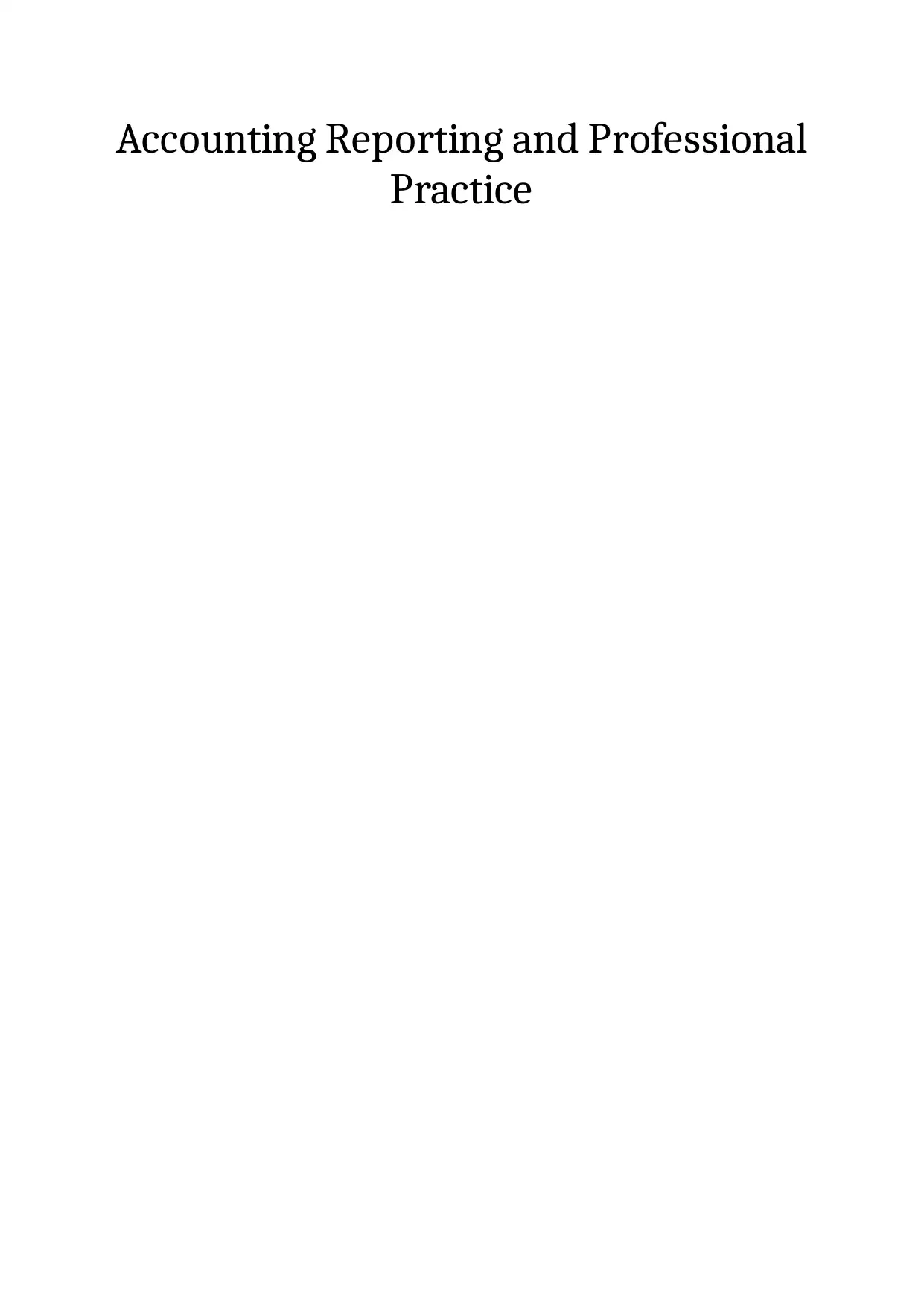
Accounting Reporting and Professional
Practice
Practice
Paraphrase This Document
Need a fresh take? Get an instant paraphrase of this document with our AI Paraphraser
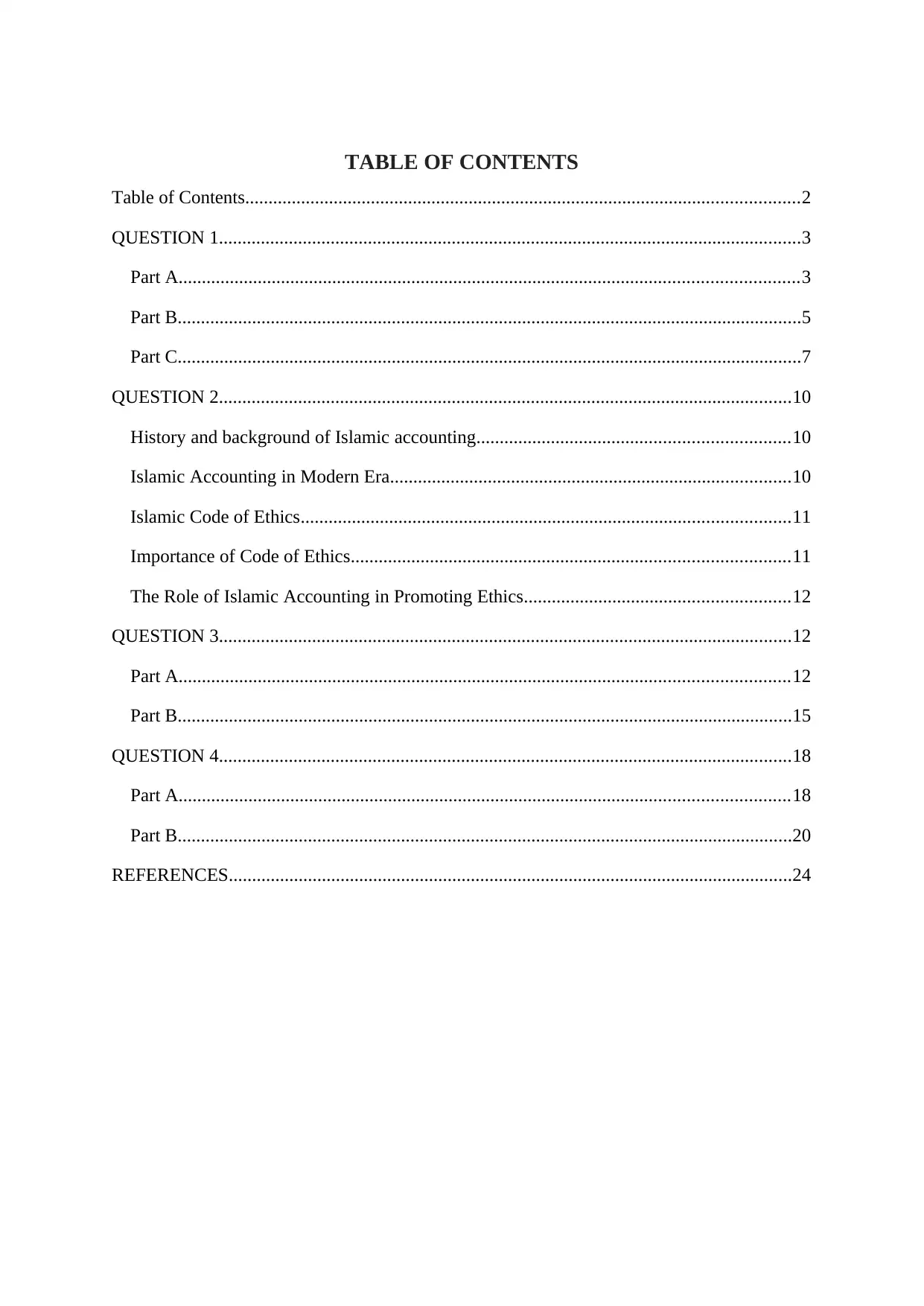
TABLE OF CONTENTS
Table of Contents.......................................................................................................................2
QUESTION 1.............................................................................................................................3
Part A.....................................................................................................................................3
Part B......................................................................................................................................5
Part C......................................................................................................................................7
QUESTION 2...........................................................................................................................10
History and background of Islamic accounting...................................................................10
Islamic Accounting in Modern Era......................................................................................10
Islamic Code of Ethics.........................................................................................................11
Importance of Code of Ethics..............................................................................................11
The Role of Islamic Accounting in Promoting Ethics.........................................................12
QUESTION 3...........................................................................................................................12
Part A...................................................................................................................................12
Part B....................................................................................................................................15
QUESTION 4...........................................................................................................................18
Part A...................................................................................................................................18
Part B....................................................................................................................................20
REFERENCES.........................................................................................................................24
Table of Contents.......................................................................................................................2
QUESTION 1.............................................................................................................................3
Part A.....................................................................................................................................3
Part B......................................................................................................................................5
Part C......................................................................................................................................7
QUESTION 2...........................................................................................................................10
History and background of Islamic accounting...................................................................10
Islamic Accounting in Modern Era......................................................................................10
Islamic Code of Ethics.........................................................................................................11
Importance of Code of Ethics..............................................................................................11
The Role of Islamic Accounting in Promoting Ethics.........................................................12
QUESTION 3...........................................................................................................................12
Part A...................................................................................................................................12
Part B....................................................................................................................................15
QUESTION 4...........................................................................................................................18
Part A...................................................................................................................................18
Part B....................................................................................................................................20
REFERENCES.........................................................................................................................24
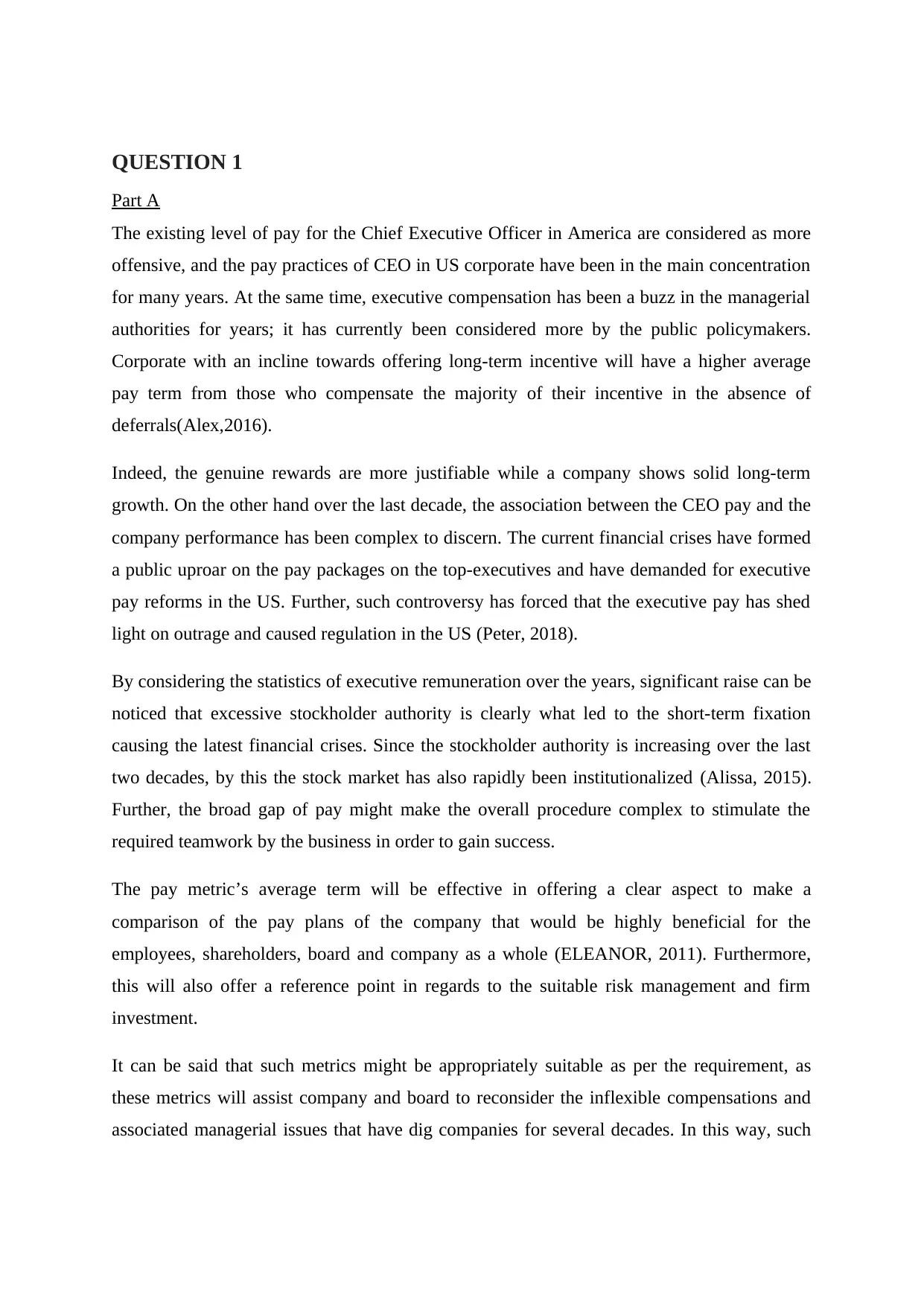
QUESTION 1
Part A
The existing level of pay for the Chief Executive Officer in America are considered as more
offensive, and the pay practices of CEO in US corporate have been in the main concentration
for many years. At the same time, executive compensation has been a buzz in the managerial
authorities for years; it has currently been considered more by the public policymakers.
Corporate with an incline towards offering long-term incentive will have a higher average
pay term from those who compensate the majority of their incentive in the absence of
deferrals(Alex,2016).
Indeed, the genuine rewards are more justifiable while a company shows solid long-term
growth. On the other hand over the last decade, the association between the CEO pay and the
company performance has been complex to discern. The current financial crises have formed
a public uproar on the pay packages on the top-executives and have demanded for executive
pay reforms in the US. Further, such controversy has forced that the executive pay has shed
light on outrage and caused regulation in the US (Peter, 2018).
By considering the statistics of executive remuneration over the years, significant raise can be
noticed that excessive stockholder authority is clearly what led to the short-term fixation
causing the latest financial crises. Since the stockholder authority is increasing over the last
two decades, by this the stock market has also rapidly been institutionalized (Alissa, 2015).
Further, the broad gap of pay might make the overall procedure complex to stimulate the
required teamwork by the business in order to gain success.
The pay metric’s average term will be effective in offering a clear aspect to make a
comparison of the pay plans of the company that would be highly beneficial for the
employees, shareholders, board and company as a whole (ELEANOR, 2011). Furthermore,
this will also offer a reference point in regards to the suitable risk management and firm
investment.
It can be said that such metrics might be appropriately suitable as per the requirement, as
these metrics will assist company and board to reconsider the inflexible compensations and
associated managerial issues that have dig companies for several decades. In this way, such
Part A
The existing level of pay for the Chief Executive Officer in America are considered as more
offensive, and the pay practices of CEO in US corporate have been in the main concentration
for many years. At the same time, executive compensation has been a buzz in the managerial
authorities for years; it has currently been considered more by the public policymakers.
Corporate with an incline towards offering long-term incentive will have a higher average
pay term from those who compensate the majority of their incentive in the absence of
deferrals(Alex,2016).
Indeed, the genuine rewards are more justifiable while a company shows solid long-term
growth. On the other hand over the last decade, the association between the CEO pay and the
company performance has been complex to discern. The current financial crises have formed
a public uproar on the pay packages on the top-executives and have demanded for executive
pay reforms in the US. Further, such controversy has forced that the executive pay has shed
light on outrage and caused regulation in the US (Peter, 2018).
By considering the statistics of executive remuneration over the years, significant raise can be
noticed that excessive stockholder authority is clearly what led to the short-term fixation
causing the latest financial crises. Since the stockholder authority is increasing over the last
two decades, by this the stock market has also rapidly been institutionalized (Alissa, 2015).
Further, the broad gap of pay might make the overall procedure complex to stimulate the
required teamwork by the business in order to gain success.
The pay metric’s average term will be effective in offering a clear aspect to make a
comparison of the pay plans of the company that would be highly beneficial for the
employees, shareholders, board and company as a whole (ELEANOR, 2011). Furthermore,
this will also offer a reference point in regards to the suitable risk management and firm
investment.
It can be said that such metrics might be appropriately suitable as per the requirement, as
these metrics will assist company and board to reconsider the inflexible compensations and
associated managerial issues that have dig companies for several decades. In this way, such
You're viewing a preview
Unlock full access by subscribing today!
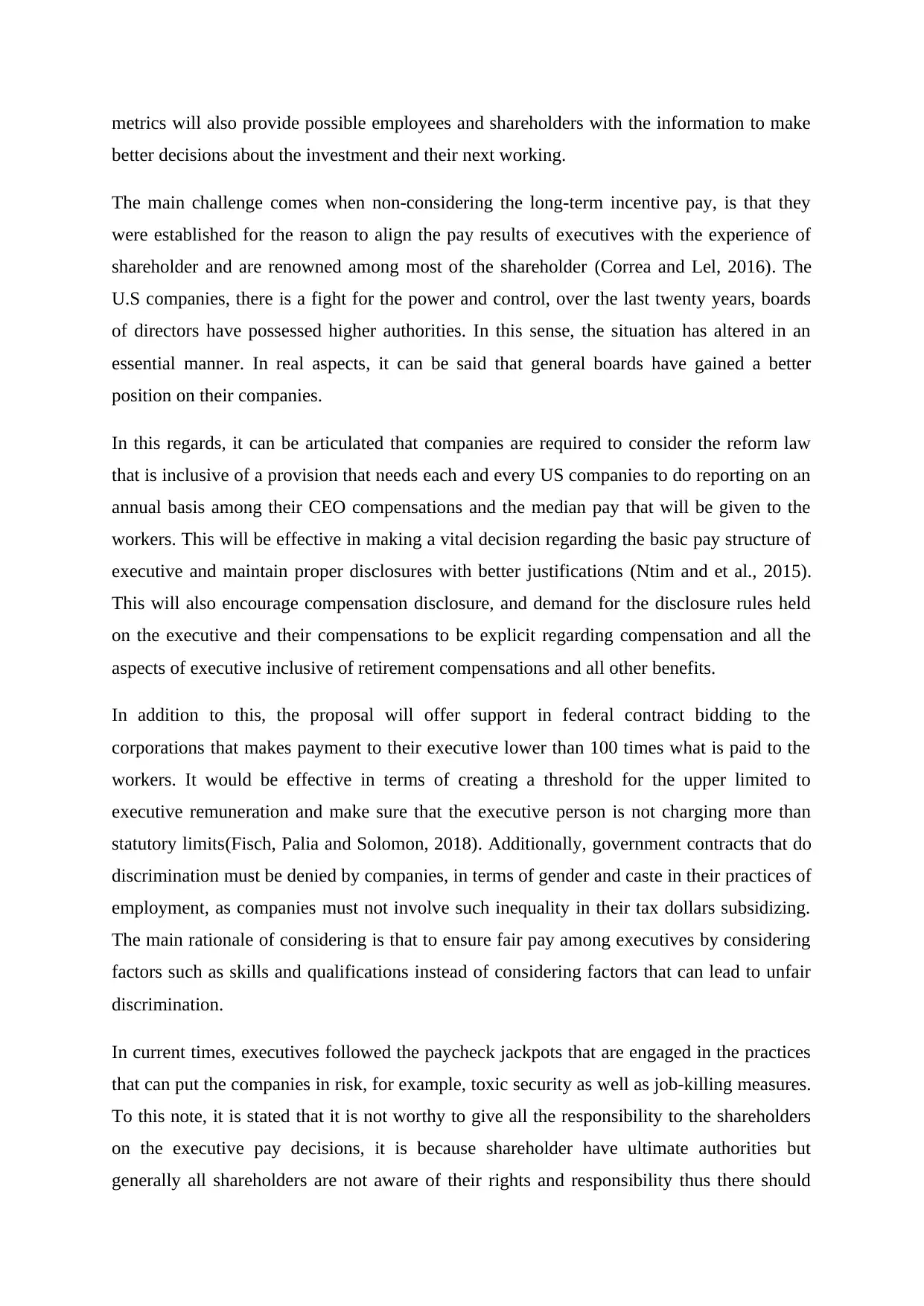
metrics will also provide possible employees and shareholders with the information to make
better decisions about the investment and their next working.
The main challenge comes when non-considering the long-term incentive pay, is that they
were established for the reason to align the pay results of executives with the experience of
shareholder and are renowned among most of the shareholder (Correa and Lel, 2016). The
U.S companies, there is a fight for the power and control, over the last twenty years, boards
of directors have possessed higher authorities. In this sense, the situation has altered in an
essential manner. In real aspects, it can be said that general boards have gained a better
position on their companies.
In this regards, it can be articulated that companies are required to consider the reform law
that is inclusive of a provision that needs each and every US companies to do reporting on an
annual basis among their CEO compensations and the median pay that will be given to the
workers. This will be effective in making a vital decision regarding the basic pay structure of
executive and maintain proper disclosures with better justifications (Ntim and et al., 2015).
This will also encourage compensation disclosure, and demand for the disclosure rules held
on the executive and their compensations to be explicit regarding compensation and all the
aspects of executive inclusive of retirement compensations and all other benefits.
In addition to this, the proposal will offer support in federal contract bidding to the
corporations that makes payment to their executive lower than 100 times what is paid to the
workers. It would be effective in terms of creating a threshold for the upper limited to
executive remuneration and make sure that the executive person is not charging more than
statutory limits(Fisch, Palia and Solomon, 2018). Additionally, government contracts that do
discrimination must be denied by companies, in terms of gender and caste in their practices of
employment, as companies must not involve such inequality in their tax dollars subsidizing.
The main rationale of considering is that to ensure fair pay among executives by considering
factors such as skills and qualifications instead of considering factors that can lead to unfair
discrimination.
In current times, executives followed the paycheck jackpots that are engaged in the practices
that can put the companies in risk, for example, toxic security as well as job-killing measures.
To this note, it is stated that it is not worthy to give all the responsibility to the shareholders
on the executive pay decisions, it is because shareholder have ultimate authorities but
generally all shareholders are not aware of their rights and responsibility thus there should
better decisions about the investment and their next working.
The main challenge comes when non-considering the long-term incentive pay, is that they
were established for the reason to align the pay results of executives with the experience of
shareholder and are renowned among most of the shareholder (Correa and Lel, 2016). The
U.S companies, there is a fight for the power and control, over the last twenty years, boards
of directors have possessed higher authorities. In this sense, the situation has altered in an
essential manner. In real aspects, it can be said that general boards have gained a better
position on their companies.
In this regards, it can be articulated that companies are required to consider the reform law
that is inclusive of a provision that needs each and every US companies to do reporting on an
annual basis among their CEO compensations and the median pay that will be given to the
workers. This will be effective in making a vital decision regarding the basic pay structure of
executive and maintain proper disclosures with better justifications (Ntim and et al., 2015).
This will also encourage compensation disclosure, and demand for the disclosure rules held
on the executive and their compensations to be explicit regarding compensation and all the
aspects of executive inclusive of retirement compensations and all other benefits.
In addition to this, the proposal will offer support in federal contract bidding to the
corporations that makes payment to their executive lower than 100 times what is paid to the
workers. It would be effective in terms of creating a threshold for the upper limited to
executive remuneration and make sure that the executive person is not charging more than
statutory limits(Fisch, Palia and Solomon, 2018). Additionally, government contracts that do
discrimination must be denied by companies, in terms of gender and caste in their practices of
employment, as companies must not involve such inequality in their tax dollars subsidizing.
The main rationale of considering is that to ensure fair pay among executives by considering
factors such as skills and qualifications instead of considering factors that can lead to unfair
discrimination.
In current times, executives followed the paycheck jackpots that are engaged in the practices
that can put the companies in risk, for example, toxic security as well as job-killing measures.
To this note, it is stated that it is not worthy to give all the responsibility to the shareholders
on the executive pay decisions, it is because shareholder have ultimate authorities but
generally all shareholders are not aware of their rights and responsibility thus there should
Paraphrase This Document
Need a fresh take? Get an instant paraphrase of this document with our AI Paraphraser
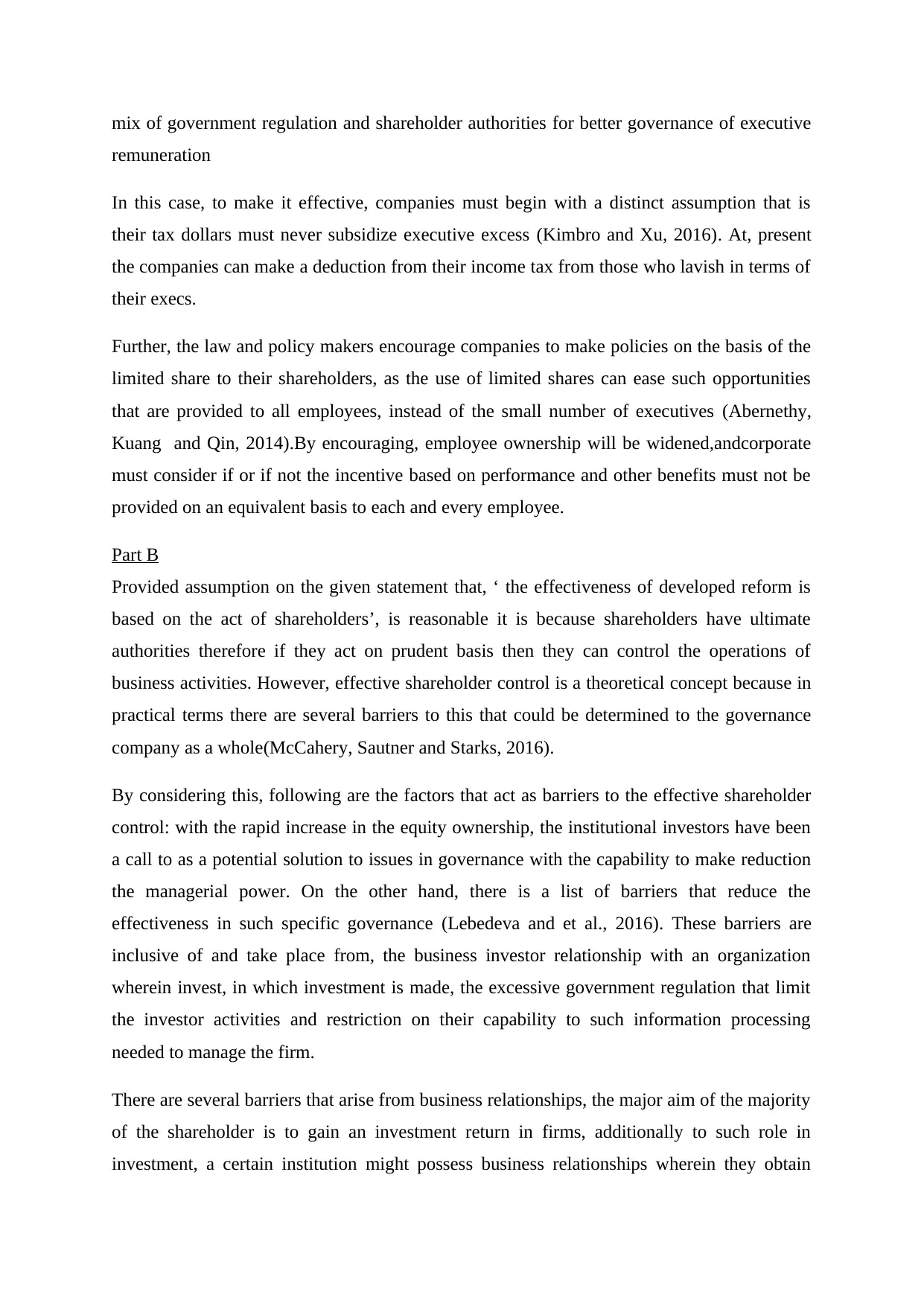
mix of government regulation and shareholder authorities for better governance of executive
remuneration
In this case, to make it effective, companies must begin with a distinct assumption that is
their tax dollars must never subsidize executive excess (Kimbro and Xu, 2016). At, present
the companies can make a deduction from their income tax from those who lavish in terms of
their execs.
Further, the law and policy makers encourage companies to make policies on the basis of the
limited share to their shareholders, as the use of limited shares can ease such opportunities
that are provided to all employees, instead of the small number of executives (Abernethy,
Kuang and Qin, 2014).By encouraging, employee ownership will be widened,andcorporate
must consider if or if not the incentive based on performance and other benefits must not be
provided on an equivalent basis to each and every employee.
Part B
Provided assumption on the given statement that, ‘ the effectiveness of developed reform is
based on the act of shareholders’, is reasonable it is because shareholders have ultimate
authorities therefore if they act on prudent basis then they can control the operations of
business activities. However, effective shareholder control is a theoretical concept because in
practical terms there are several barriers to this that could be determined to the governance
company as a whole(McCahery, Sautner and Starks, 2016).
By considering this, following are the factors that act as barriers to the effective shareholder
control: with the rapid increase in the equity ownership, the institutional investors have been
a call to as a potential solution to issues in governance with the capability to make reduction
the managerial power. On the other hand, there is a list of barriers that reduce the
effectiveness in such specific governance (Lebedeva and et al., 2016). These barriers are
inclusive of and take place from, the business investor relationship with an organization
wherein invest, in which investment is made, the excessive government regulation that limit
the investor activities and restriction on their capability to such information processing
needed to manage the firm.
There are several barriers that arise from business relationships, the major aim of the majority
of the shareholder is to gain an investment return in firms, additionally to such role in
investment, a certain institution might possess business relationships wherein they obtain
remuneration
In this case, to make it effective, companies must begin with a distinct assumption that is
their tax dollars must never subsidize executive excess (Kimbro and Xu, 2016). At, present
the companies can make a deduction from their income tax from those who lavish in terms of
their execs.
Further, the law and policy makers encourage companies to make policies on the basis of the
limited share to their shareholders, as the use of limited shares can ease such opportunities
that are provided to all employees, instead of the small number of executives (Abernethy,
Kuang and Qin, 2014).By encouraging, employee ownership will be widened,andcorporate
must consider if or if not the incentive based on performance and other benefits must not be
provided on an equivalent basis to each and every employee.
Part B
Provided assumption on the given statement that, ‘ the effectiveness of developed reform is
based on the act of shareholders’, is reasonable it is because shareholders have ultimate
authorities therefore if they act on prudent basis then they can control the operations of
business activities. However, effective shareholder control is a theoretical concept because in
practical terms there are several barriers to this that could be determined to the governance
company as a whole(McCahery, Sautner and Starks, 2016).
By considering this, following are the factors that act as barriers to the effective shareholder
control: with the rapid increase in the equity ownership, the institutional investors have been
a call to as a potential solution to issues in governance with the capability to make reduction
the managerial power. On the other hand, there is a list of barriers that reduce the
effectiveness in such specific governance (Lebedeva and et al., 2016). These barriers are
inclusive of and take place from, the business investor relationship with an organization
wherein invest, in which investment is made, the excessive government regulation that limit
the investor activities and restriction on their capability to such information processing
needed to manage the firm.
There are several barriers that arise from business relationships, the major aim of the majority
of the shareholder is to gain an investment return in firms, additionally to such role in
investment, a certain institution might possess business relationships wherein they obtain
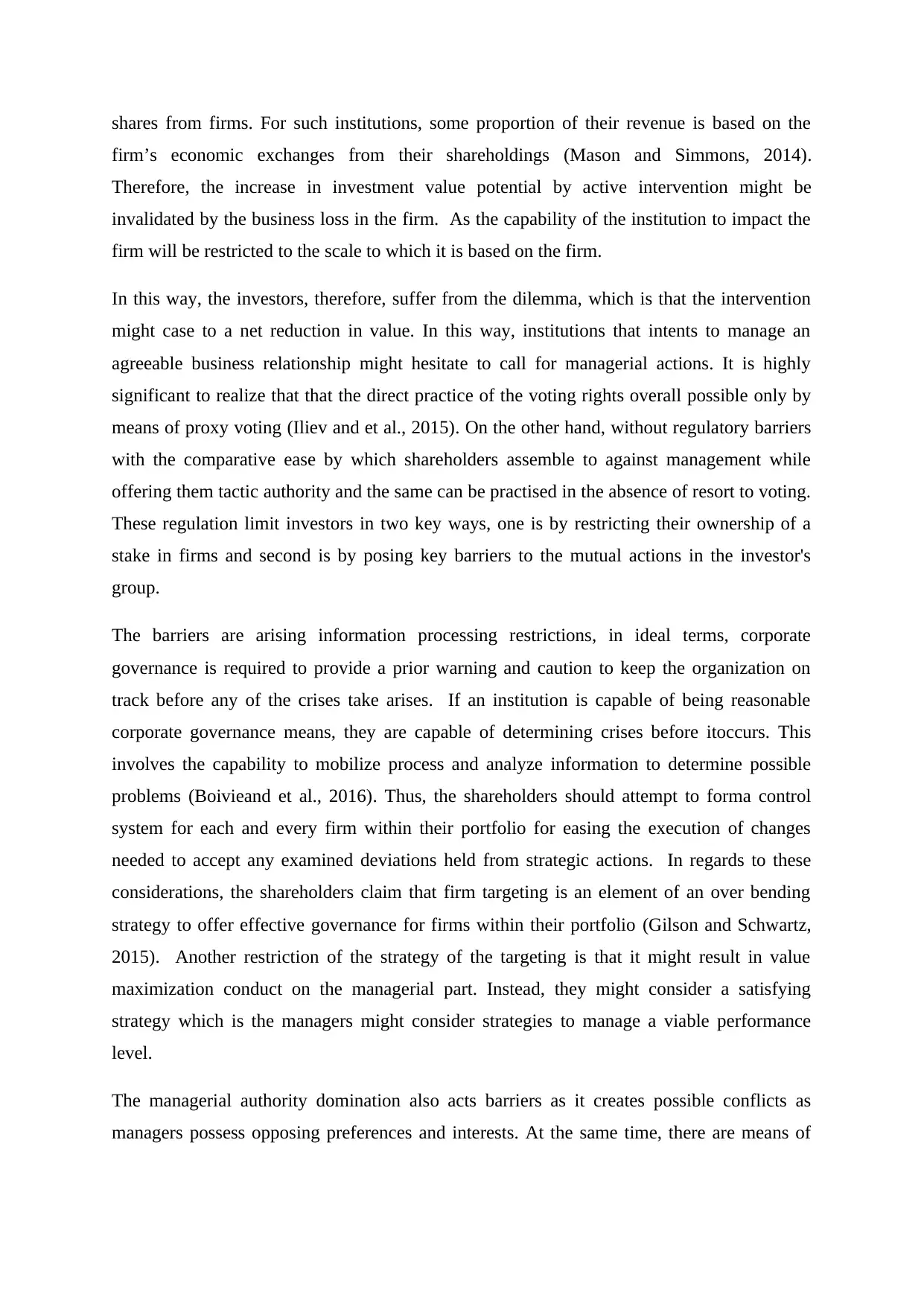
shares from firms. For such institutions, some proportion of their revenue is based on the
firm’s economic exchanges from their shareholdings (Mason and Simmons, 2014).
Therefore, the increase in investment value potential by active intervention might be
invalidated by the business loss in the firm. As the capability of the institution to impact the
firm will be restricted to the scale to which it is based on the firm.
In this way, the investors, therefore, suffer from the dilemma, which is that the intervention
might case to a net reduction in value. In this way, institutions that intents to manage an
agreeable business relationship might hesitate to call for managerial actions. It is highly
significant to realize that that the direct practice of the voting rights overall possible only by
means of proxy voting (Iliev and et al., 2015). On the other hand, without regulatory barriers
with the comparative ease by which shareholders assemble to against management while
offering them tactic authority and the same can be practised in the absence of resort to voting.
These regulation limit investors in two key ways, one is by restricting their ownership of a
stake in firms and second is by posing key barriers to the mutual actions in the investor's
group.
The barriers are arising information processing restrictions, in ideal terms, corporate
governance is required to provide a prior warning and caution to keep the organization on
track before any of the crises take arises. If an institution is capable of being reasonable
corporate governance means, they are capable of determining crises before itoccurs. This
involves the capability to mobilize process and analyze information to determine possible
problems (Boivieand et al., 2016). Thus, the shareholders should attempt to forma control
system for each and every firm within their portfolio for easing the execution of changes
needed to accept any examined deviations held from strategic actions. In regards to these
considerations, the shareholders claim that firm targeting is an element of an over bending
strategy to offer effective governance for firms within their portfolio (Gilson and Schwartz,
2015). Another restriction of the strategy of the targeting is that it might result in value
maximization conduct on the managerial part. Instead, they might consider a satisfying
strategy which is the managers might consider strategies to manage a viable performance
level.
The managerial authority domination also acts barriers as it creates possible conflicts as
managers possess opposing preferences and interests. At the same time, there are means of
firm’s economic exchanges from their shareholdings (Mason and Simmons, 2014).
Therefore, the increase in investment value potential by active intervention might be
invalidated by the business loss in the firm. As the capability of the institution to impact the
firm will be restricted to the scale to which it is based on the firm.
In this way, the investors, therefore, suffer from the dilemma, which is that the intervention
might case to a net reduction in value. In this way, institutions that intents to manage an
agreeable business relationship might hesitate to call for managerial actions. It is highly
significant to realize that that the direct practice of the voting rights overall possible only by
means of proxy voting (Iliev and et al., 2015). On the other hand, without regulatory barriers
with the comparative ease by which shareholders assemble to against management while
offering them tactic authority and the same can be practised in the absence of resort to voting.
These regulation limit investors in two key ways, one is by restricting their ownership of a
stake in firms and second is by posing key barriers to the mutual actions in the investor's
group.
The barriers are arising information processing restrictions, in ideal terms, corporate
governance is required to provide a prior warning and caution to keep the organization on
track before any of the crises take arises. If an institution is capable of being reasonable
corporate governance means, they are capable of determining crises before itoccurs. This
involves the capability to mobilize process and analyze information to determine possible
problems (Boivieand et al., 2016). Thus, the shareholders should attempt to forma control
system for each and every firm within their portfolio for easing the execution of changes
needed to accept any examined deviations held from strategic actions. In regards to these
considerations, the shareholders claim that firm targeting is an element of an over bending
strategy to offer effective governance for firms within their portfolio (Gilson and Schwartz,
2015). Another restriction of the strategy of the targeting is that it might result in value
maximization conduct on the managerial part. Instead, they might consider a satisfying
strategy which is the managers might consider strategies to manage a viable performance
level.
The managerial authority domination also acts barriers as it creates possible conflicts as
managers possess opposing preferences and interests. At the same time, there are means of
You're viewing a preview
Unlock full access by subscribing today!
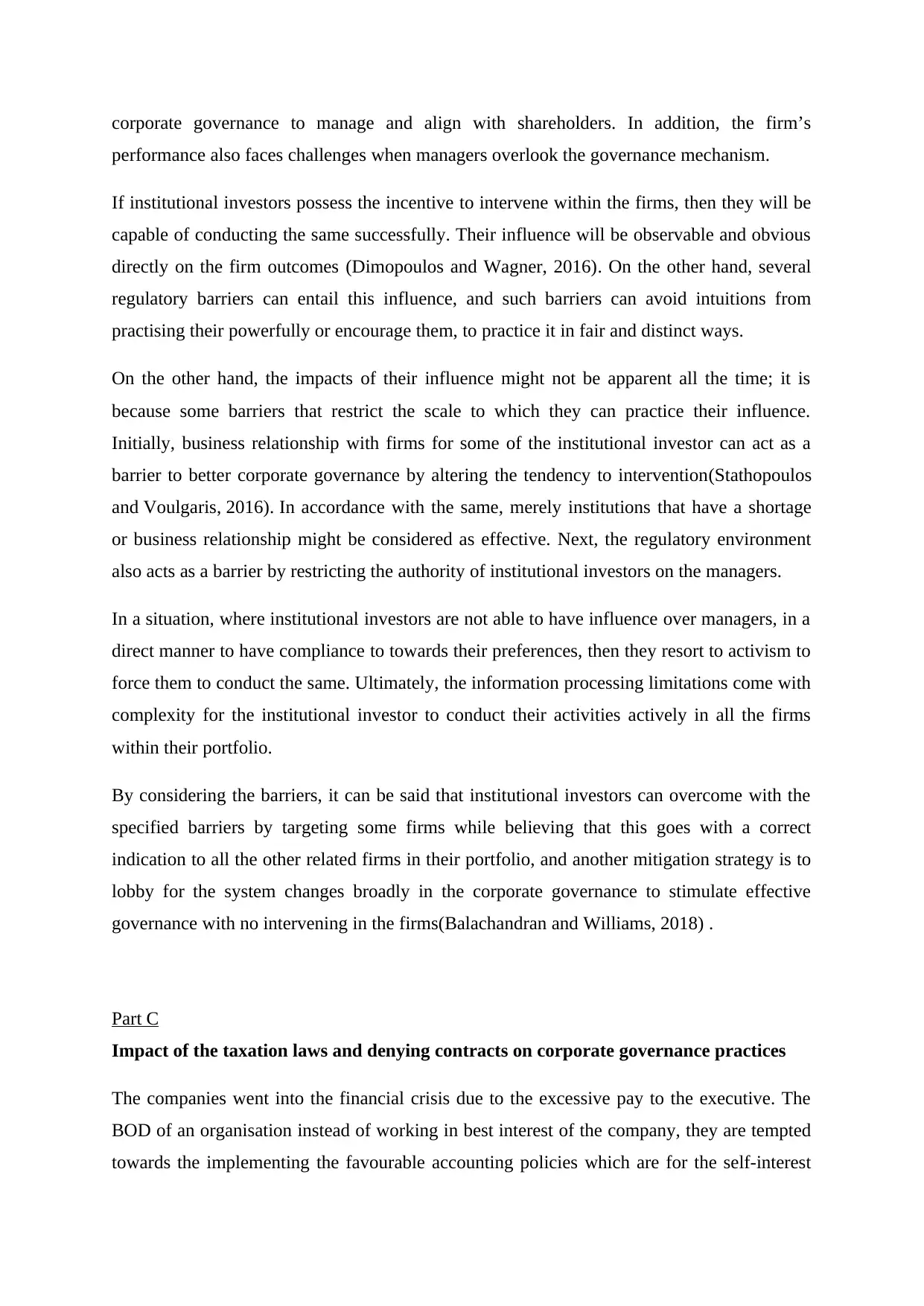
corporate governance to manage and align with shareholders. In addition, the firm’s
performance also faces challenges when managers overlook the governance mechanism.
If institutional investors possess the incentive to intervene within the firms, then they will be
capable of conducting the same successfully. Their influence will be observable and obvious
directly on the firm outcomes (Dimopoulos and Wagner, 2016). On the other hand, several
regulatory barriers can entail this influence, and such barriers can avoid intuitions from
practising their powerfully or encourage them, to practice it in fair and distinct ways.
On the other hand, the impacts of their influence might not be apparent all the time; it is
because some barriers that restrict the scale to which they can practice their influence.
Initially, business relationship with firms for some of the institutional investor can act as a
barrier to better corporate governance by altering the tendency to intervention(Stathopoulos
and Voulgaris, 2016). In accordance with the same, merely institutions that have a shortage
or business relationship might be considered as effective. Next, the regulatory environment
also acts as a barrier by restricting the authority of institutional investors on the managers.
In a situation, where institutional investors are not able to have influence over managers, in a
direct manner to have compliance to towards their preferences, then they resort to activism to
force them to conduct the same. Ultimately, the information processing limitations come with
complexity for the institutional investor to conduct their activities actively in all the firms
within their portfolio.
By considering the barriers, it can be said that institutional investors can overcome with the
specified barriers by targeting some firms while believing that this goes with a correct
indication to all the other related firms in their portfolio, and another mitigation strategy is to
lobby for the system changes broadly in the corporate governance to stimulate effective
governance with no intervening in the firms(Balachandran and Williams, 2018) .
Part C
Impact of the taxation laws and denying contracts on corporate governance practices
The companies went into the financial crisis due to the excessive pay to the executive. The
BOD of an organisation instead of working in best interest of the company, they are tempted
towards the implementing the favourable accounting policies which are for the self-interest
performance also faces challenges when managers overlook the governance mechanism.
If institutional investors possess the incentive to intervene within the firms, then they will be
capable of conducting the same successfully. Their influence will be observable and obvious
directly on the firm outcomes (Dimopoulos and Wagner, 2016). On the other hand, several
regulatory barriers can entail this influence, and such barriers can avoid intuitions from
practising their powerfully or encourage them, to practice it in fair and distinct ways.
On the other hand, the impacts of their influence might not be apparent all the time; it is
because some barriers that restrict the scale to which they can practice their influence.
Initially, business relationship with firms for some of the institutional investor can act as a
barrier to better corporate governance by altering the tendency to intervention(Stathopoulos
and Voulgaris, 2016). In accordance with the same, merely institutions that have a shortage
or business relationship might be considered as effective. Next, the regulatory environment
also acts as a barrier by restricting the authority of institutional investors on the managers.
In a situation, where institutional investors are not able to have influence over managers, in a
direct manner to have compliance to towards their preferences, then they resort to activism to
force them to conduct the same. Ultimately, the information processing limitations come with
complexity for the institutional investor to conduct their activities actively in all the firms
within their portfolio.
By considering the barriers, it can be said that institutional investors can overcome with the
specified barriers by targeting some firms while believing that this goes with a correct
indication to all the other related firms in their portfolio, and another mitigation strategy is to
lobby for the system changes broadly in the corporate governance to stimulate effective
governance with no intervening in the firms(Balachandran and Williams, 2018) .
Part C
Impact of the taxation laws and denying contracts on corporate governance practices
The companies went into the financial crisis due to the excessive pay to the executive. The
BOD of an organisation instead of working in best interest of the company, they are tempted
towards the implementing the favourable accounting policies which are for the self-interest
Paraphrase This Document
Need a fresh take? Get an instant paraphrase of this document with our AI Paraphraser
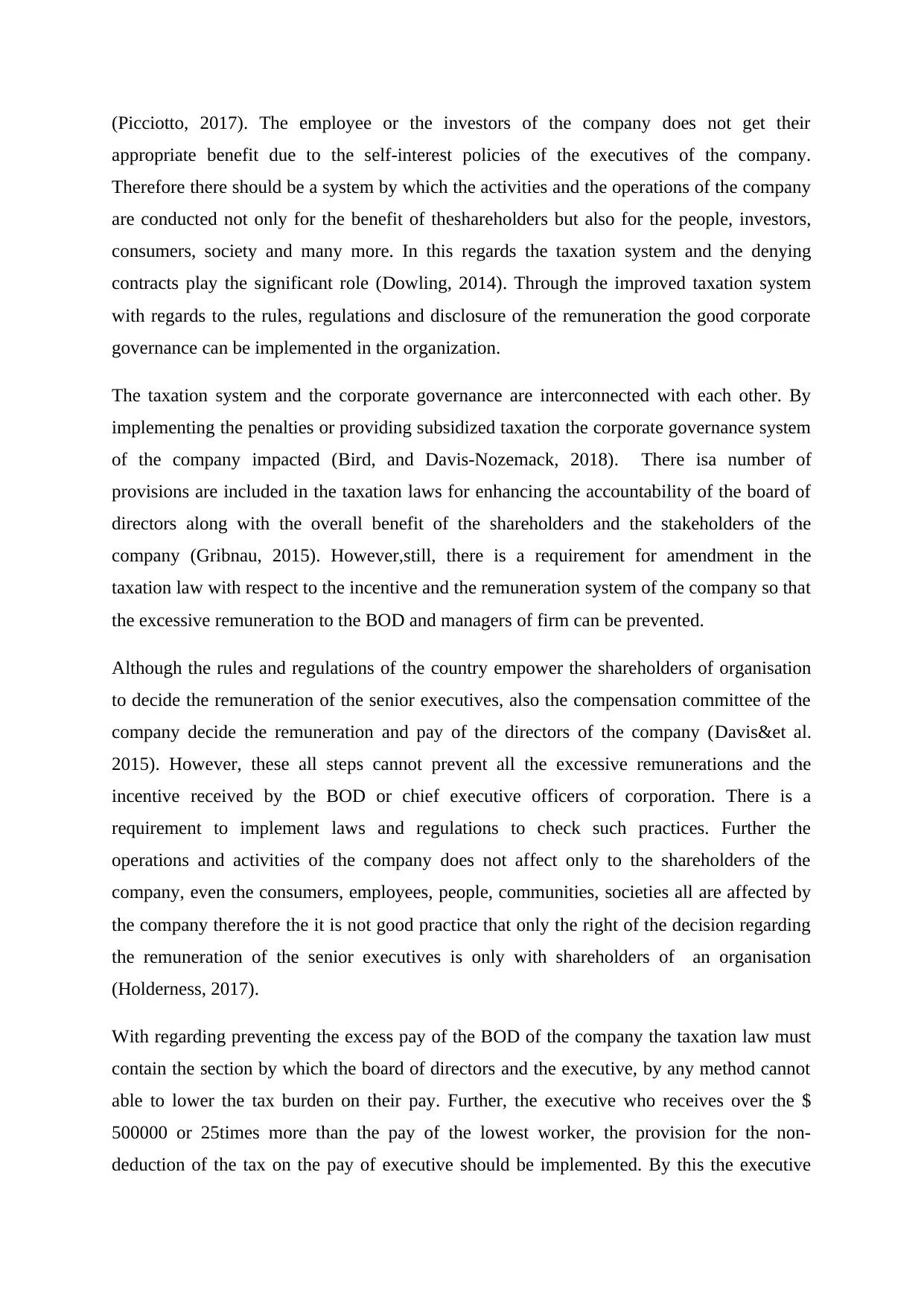
(Picciotto, 2017). The employee or the investors of the company does not get their
appropriate benefit due to the self-interest policies of the executives of the company.
Therefore there should be a system by which the activities and the operations of the company
are conducted not only for the benefit of theshareholders but also for the people, investors,
consumers, society and many more. In this regards the taxation system and the denying
contracts play the significant role (Dowling, 2014). Through the improved taxation system
with regards to the rules, regulations and disclosure of the remuneration the good corporate
governance can be implemented in the organization.
The taxation system and the corporate governance are interconnected with each other. By
implementing the penalties or providing subsidized taxation the corporate governance system
of the company impacted (Bird, and Davis-Nozemack, 2018). There isa number of
provisions are included in the taxation laws for enhancing the accountability of the board of
directors along with the overall benefit of the shareholders and the stakeholders of the
company (Gribnau, 2015). However,still, there is a requirement for amendment in the
taxation law with respect to the incentive and the remuneration system of the company so that
the excessive remuneration to the BOD and managers of firm can be prevented.
Although the rules and regulations of the country empower the shareholders of organisation
to decide the remuneration of the senior executives, also the compensation committee of the
company decide the remuneration and pay of the directors of the company (Davis&et al.
2015). However, these all steps cannot prevent all the excessive remunerations and the
incentive received by the BOD or chief executive officers of corporation. There is a
requirement to implement laws and regulations to check such practices. Further the
operations and activities of the company does not affect only to the shareholders of the
company, even the consumers, employees, people, communities, societies all are affected by
the company therefore the it is not good practice that only the right of the decision regarding
the remuneration of the senior executives is only with shareholders of an organisation
(Holderness, 2017).
With regarding preventing the excess pay of the BOD of the company the taxation law must
contain the section by which the board of directors and the executive, by any method cannot
able to lower the tax burden on their pay. Further, the executive who receives over the $
500000 or 25times more than the pay of the lowest worker, the provision for the non-
deduction of the tax on the pay of executive should be implemented. By this the executive
appropriate benefit due to the self-interest policies of the executives of the company.
Therefore there should be a system by which the activities and the operations of the company
are conducted not only for the benefit of theshareholders but also for the people, investors,
consumers, society and many more. In this regards the taxation system and the denying
contracts play the significant role (Dowling, 2014). Through the improved taxation system
with regards to the rules, regulations and disclosure of the remuneration the good corporate
governance can be implemented in the organization.
The taxation system and the corporate governance are interconnected with each other. By
implementing the penalties or providing subsidized taxation the corporate governance system
of the company impacted (Bird, and Davis-Nozemack, 2018). There isa number of
provisions are included in the taxation laws for enhancing the accountability of the board of
directors along with the overall benefit of the shareholders and the stakeholders of the
company (Gribnau, 2015). However,still, there is a requirement for amendment in the
taxation law with respect to the incentive and the remuneration system of the company so that
the excessive remuneration to the BOD and managers of firm can be prevented.
Although the rules and regulations of the country empower the shareholders of organisation
to decide the remuneration of the senior executives, also the compensation committee of the
company decide the remuneration and pay of the directors of the company (Davis&et al.
2015). However, these all steps cannot prevent all the excessive remunerations and the
incentive received by the BOD or chief executive officers of corporation. There is a
requirement to implement laws and regulations to check such practices. Further the
operations and activities of the company does not affect only to the shareholders of the
company, even the consumers, employees, people, communities, societies all are affected by
the company therefore the it is not good practice that only the right of the decision regarding
the remuneration of the senior executives is only with shareholders of an organisation
(Holderness, 2017).
With regarding preventing the excess pay of the BOD of the company the taxation law must
contain the section by which the board of directors and the executive, by any method cannot
able to lower the tax burden on their pay. Further, the executive who receives over the $
500000 or 25times more than the pay of the lowest worker, the provision for the non-
deduction of the tax on the pay of executive should be implemented. By this the executive
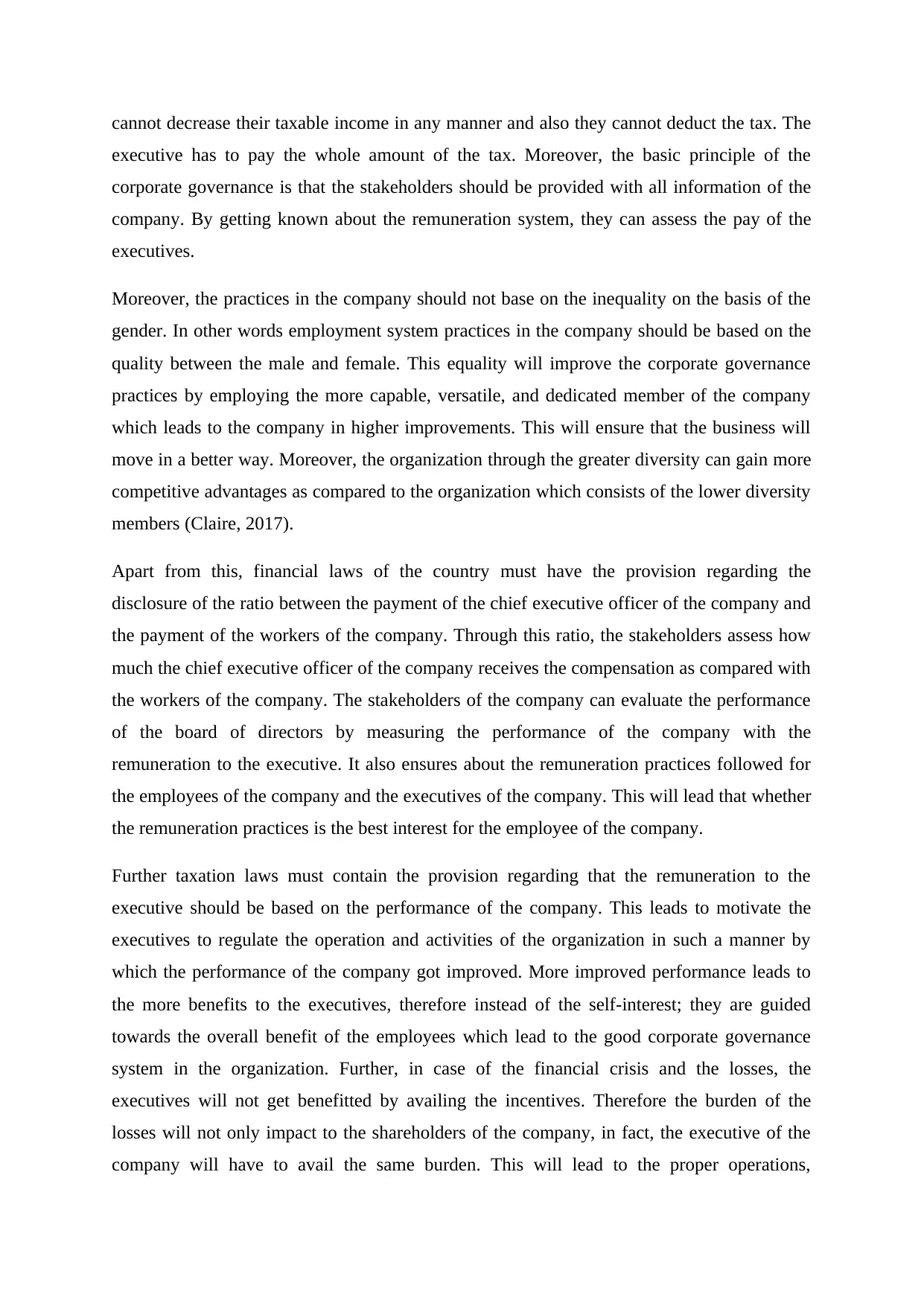
cannot decrease their taxable income in any manner and also they cannot deduct the tax. The
executive has to pay the whole amount of the tax. Moreover, the basic principle of the
corporate governance is that the stakeholders should be provided with all information of the
company. By getting known about the remuneration system, they can assess the pay of the
executives.
Moreover, the practices in the company should not base on the inequality on the basis of the
gender. In other words employment system practices in the company should be based on the
quality between the male and female. This equality will improve the corporate governance
practices by employing the more capable, versatile, and dedicated member of the company
which leads to the company in higher improvements. This will ensure that the business will
move in a better way. Moreover, the organization through the greater diversity can gain more
competitive advantages as compared to the organization which consists of the lower diversity
members (Claire, 2017).
Apart from this, financial laws of the country must have the provision regarding the
disclosure of the ratio between the payment of the chief executive officer of the company and
the payment of the workers of the company. Through this ratio, the stakeholders assess how
much the chief executive officer of the company receives the compensation as compared with
the workers of the company. The stakeholders of the company can evaluate the performance
of the board of directors by measuring the performance of the company with the
remuneration to the executive. It also ensures about the remuneration practices followed for
the employees of the company and the executives of the company. This will lead that whether
the remuneration practices is the best interest for the employee of the company.
Further taxation laws must contain the provision regarding that the remuneration to the
executive should be based on the performance of the company. This leads to motivate the
executives to regulate the operation and activities of the organization in such a manner by
which the performance of the company got improved. More improved performance leads to
the more benefits to the executives, therefore instead of the self-interest; they are guided
towards the overall benefit of the employees which lead to the good corporate governance
system in the organization. Further, in case of the financial crisis and the losses, the
executives will not get benefitted by availing the incentives. Therefore the burden of the
losses will not only impact to the shareholders of the company, in fact, the executive of the
company will have to avail the same burden. This will lead to the proper operations,
executive has to pay the whole amount of the tax. Moreover, the basic principle of the
corporate governance is that the stakeholders should be provided with all information of the
company. By getting known about the remuneration system, they can assess the pay of the
executives.
Moreover, the practices in the company should not base on the inequality on the basis of the
gender. In other words employment system practices in the company should be based on the
quality between the male and female. This equality will improve the corporate governance
practices by employing the more capable, versatile, and dedicated member of the company
which leads to the company in higher improvements. This will ensure that the business will
move in a better way. Moreover, the organization through the greater diversity can gain more
competitive advantages as compared to the organization which consists of the lower diversity
members (Claire, 2017).
Apart from this, financial laws of the country must have the provision regarding the
disclosure of the ratio between the payment of the chief executive officer of the company and
the payment of the workers of the company. Through this ratio, the stakeholders assess how
much the chief executive officer of the company receives the compensation as compared with
the workers of the company. The stakeholders of the company can evaluate the performance
of the board of directors by measuring the performance of the company with the
remuneration to the executive. It also ensures about the remuneration practices followed for
the employees of the company and the executives of the company. This will lead that whether
the remuneration practices is the best interest for the employee of the company.
Further taxation laws must contain the provision regarding that the remuneration to the
executive should be based on the performance of the company. This leads to motivate the
executives to regulate the operation and activities of the organization in such a manner by
which the performance of the company got improved. More improved performance leads to
the more benefits to the executives, therefore instead of the self-interest; they are guided
towards the overall benefit of the employees which lead to the good corporate governance
system in the organization. Further, in case of the financial crisis and the losses, the
executives will not get benefitted by availing the incentives. Therefore the burden of the
losses will not only impact to the shareholders of the company, in fact, the executive of the
company will have to avail the same burden. This will lead to the proper operations,
You're viewing a preview
Unlock full access by subscribing today!
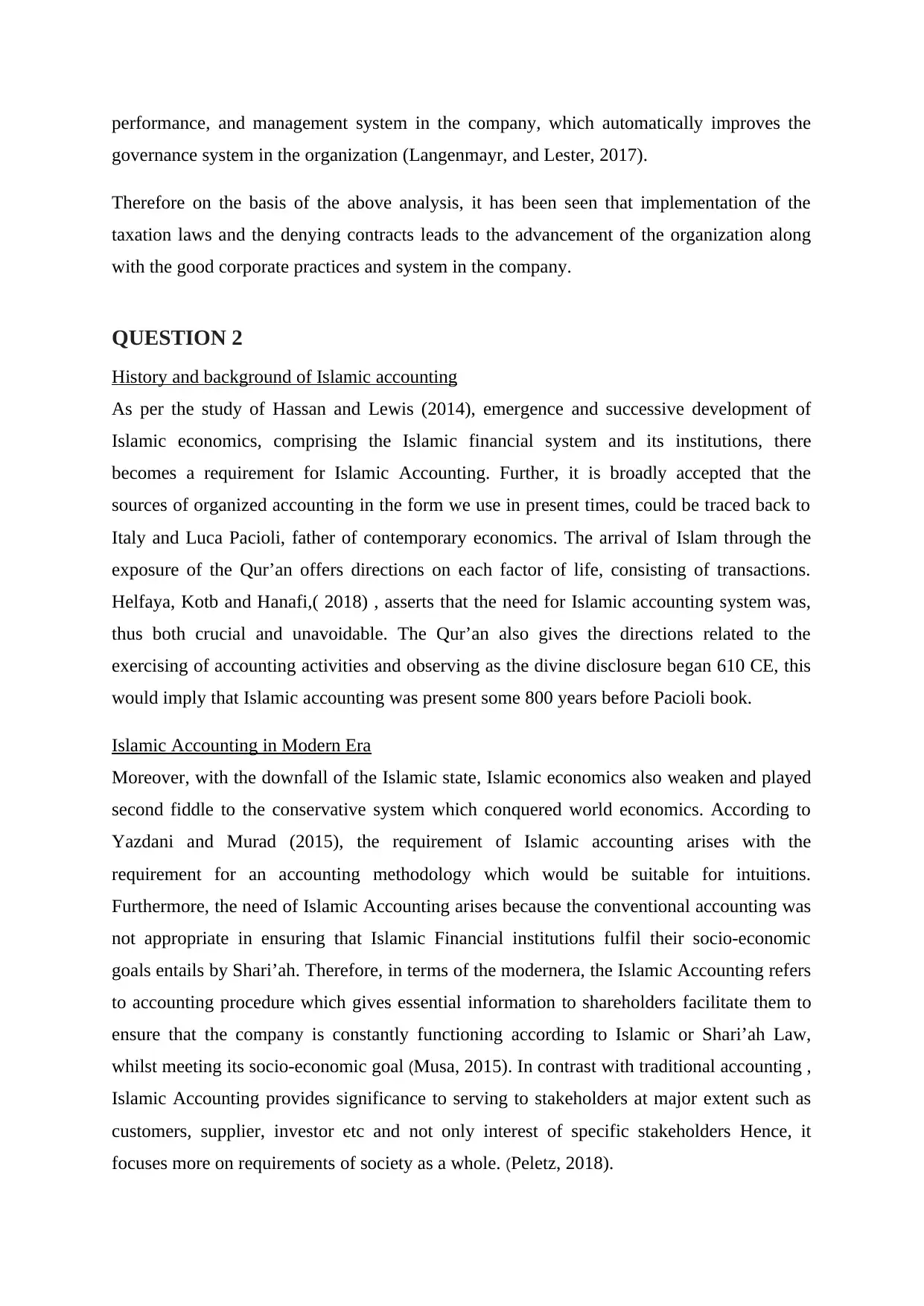
performance, and management system in the company, which automatically improves the
governance system in the organization (Langenmayr, and Lester, 2017).
Therefore on the basis of the above analysis, it has been seen that implementation of the
taxation laws and the denying contracts leads to the advancement of the organization along
with the good corporate practices and system in the company.
QUESTION 2
History and background of Islamic accounting
As per the study of Hassan and Lewis (2014), emergence and successive development of
Islamic economics, comprising the Islamic financial system and its institutions, there
becomes a requirement for Islamic Accounting. Further, it is broadly accepted that the
sources of organized accounting in the form we use in present times, could be traced back to
Italy and Luca Pacioli, father of contemporary economics. The arrival of Islam through the
exposure of the Qur’an offers directions on each factor of life, consisting of transactions.
Helfaya, Kotb and Hanafi,( 2018) , asserts that the need for Islamic accounting system was,
thus both crucial and unavoidable. The Qur’an also gives the directions related to the
exercising of accounting activities and observing as the divine disclosure began 610 CE, this
would imply that Islamic accounting was present some 800 years before Pacioli book.
Islamic Accounting in Modern Era
Moreover, with the downfall of the Islamic state, Islamic economics also weaken and played
second fiddle to the conservative system which conquered world economics. According to
Yazdani and Murad (2015), the requirement of Islamic accounting arises with the
requirement for an accounting methodology which would be suitable for intuitions.
Furthermore, the need of Islamic Accounting arises because the conventional accounting was
not appropriate in ensuring that Islamic Financial institutions fulfil their socio-economic
goals entails by Shari’ah. Therefore, in terms of the modernera, the Islamic Accounting refers
to accounting procedure which gives essential information to shareholders facilitate them to
ensure that the company is constantly functioning according to Islamic or Shari’ah Law,
whilst meeting its socio-economic goal (Musa, 2015). In contrast with traditional accounting ,
Islamic Accounting provides significance to serving to stakeholders at major extent such as
customers, supplier, investor etc and not only interest of specific stakeholders Hence, it
focuses more on requirements of society as a whole. (Peletz, 2018).
governance system in the organization (Langenmayr, and Lester, 2017).
Therefore on the basis of the above analysis, it has been seen that implementation of the
taxation laws and the denying contracts leads to the advancement of the organization along
with the good corporate practices and system in the company.
QUESTION 2
History and background of Islamic accounting
As per the study of Hassan and Lewis (2014), emergence and successive development of
Islamic economics, comprising the Islamic financial system and its institutions, there
becomes a requirement for Islamic Accounting. Further, it is broadly accepted that the
sources of organized accounting in the form we use in present times, could be traced back to
Italy and Luca Pacioli, father of contemporary economics. The arrival of Islam through the
exposure of the Qur’an offers directions on each factor of life, consisting of transactions.
Helfaya, Kotb and Hanafi,( 2018) , asserts that the need for Islamic accounting system was,
thus both crucial and unavoidable. The Qur’an also gives the directions related to the
exercising of accounting activities and observing as the divine disclosure began 610 CE, this
would imply that Islamic accounting was present some 800 years before Pacioli book.
Islamic Accounting in Modern Era
Moreover, with the downfall of the Islamic state, Islamic economics also weaken and played
second fiddle to the conservative system which conquered world economics. According to
Yazdani and Murad (2015), the requirement of Islamic accounting arises with the
requirement for an accounting methodology which would be suitable for intuitions.
Furthermore, the need of Islamic Accounting arises because the conventional accounting was
not appropriate in ensuring that Islamic Financial institutions fulfil their socio-economic
goals entails by Shari’ah. Therefore, in terms of the modernera, the Islamic Accounting refers
to accounting procedure which gives essential information to shareholders facilitate them to
ensure that the company is constantly functioning according to Islamic or Shari’ah Law,
whilst meeting its socio-economic goal (Musa, 2015). In contrast with traditional accounting ,
Islamic Accounting provides significance to serving to stakeholders at major extent such as
customers, supplier, investor etc and not only interest of specific stakeholders Hence, it
focuses more on requirements of society as a whole. (Peletz, 2018).
Paraphrase This Document
Need a fresh take? Get an instant paraphrase of this document with our AI Paraphraser
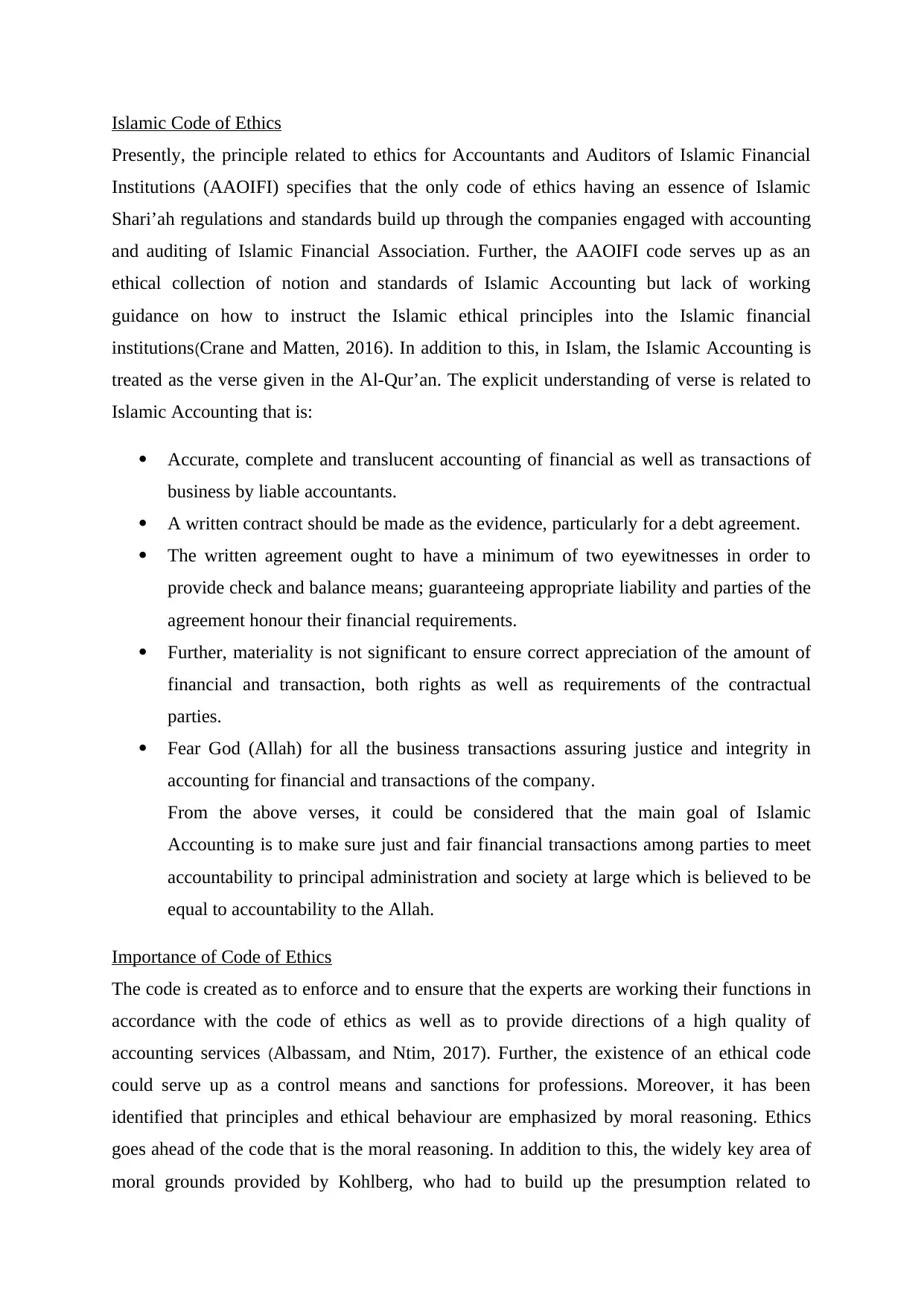
Islamic Code of Ethics
Presently, the principle related to ethics for Accountants and Auditors of Islamic Financial
Institutions (AAOIFI) specifies that the only code of ethics having an essence of Islamic
Shari’ah regulations and standards build up through the companies engaged with accounting
and auditing of Islamic Financial Association. Further, the AAOIFI code serves up as an
ethical collection of notion and standards of Islamic Accounting but lack of working
guidance on how to instruct the Islamic ethical principles into the Islamic financial
institutions(Crane and Matten, 2016). In addition to this, in Islam, the Islamic Accounting is
treated as the verse given in the Al-Qur’an. The explicit understanding of verse is related to
Islamic Accounting that is:
Accurate, complete and translucent accounting of financial as well as transactions of
business by liable accountants.
A written contract should be made as the evidence, particularly for a debt agreement.
The written agreement ought to have a minimum of two eyewitnesses in order to
provide check and balance means; guaranteeing appropriate liability and parties of the
agreement honour their financial requirements.
Further, materiality is not significant to ensure correct appreciation of the amount of
financial and transaction, both rights as well as requirements of the contractual
parties.
Fear God (Allah) for all the business transactions assuring justice and integrity in
accounting for financial and transactions of the company.
From the above verses, it could be considered that the main goal of Islamic
Accounting is to make sure just and fair financial transactions among parties to meet
accountability to principal administration and society at large which is believed to be
equal to accountability to the Allah.
Importance of Code of Ethics
The code is created as to enforce and to ensure that the experts are working their functions in
accordance with the code of ethics as well as to provide directions of a high quality of
accounting services (Albassam, and Ntim, 2017). Further, the existence of an ethical code
could serve up as a control means and sanctions for professions. Moreover, it has been
identified that principles and ethical behaviour are emphasized by moral reasoning. Ethics
goes ahead of the code that is the moral reasoning. In addition to this, the widely key area of
moral grounds provided by Kohlberg, who had to build up the presumption related to
Presently, the principle related to ethics for Accountants and Auditors of Islamic Financial
Institutions (AAOIFI) specifies that the only code of ethics having an essence of Islamic
Shari’ah regulations and standards build up through the companies engaged with accounting
and auditing of Islamic Financial Association. Further, the AAOIFI code serves up as an
ethical collection of notion and standards of Islamic Accounting but lack of working
guidance on how to instruct the Islamic ethical principles into the Islamic financial
institutions(Crane and Matten, 2016). In addition to this, in Islam, the Islamic Accounting is
treated as the verse given in the Al-Qur’an. The explicit understanding of verse is related to
Islamic Accounting that is:
Accurate, complete and translucent accounting of financial as well as transactions of
business by liable accountants.
A written contract should be made as the evidence, particularly for a debt agreement.
The written agreement ought to have a minimum of two eyewitnesses in order to
provide check and balance means; guaranteeing appropriate liability and parties of the
agreement honour their financial requirements.
Further, materiality is not significant to ensure correct appreciation of the amount of
financial and transaction, both rights as well as requirements of the contractual
parties.
Fear God (Allah) for all the business transactions assuring justice and integrity in
accounting for financial and transactions of the company.
From the above verses, it could be considered that the main goal of Islamic
Accounting is to make sure just and fair financial transactions among parties to meet
accountability to principal administration and society at large which is believed to be
equal to accountability to the Allah.
Importance of Code of Ethics
The code is created as to enforce and to ensure that the experts are working their functions in
accordance with the code of ethics as well as to provide directions of a high quality of
accounting services (Albassam, and Ntim, 2017). Further, the existence of an ethical code
could serve up as a control means and sanctions for professions. Moreover, it has been
identified that principles and ethical behaviour are emphasized by moral reasoning. Ethics
goes ahead of the code that is the moral reasoning. In addition to this, the widely key area of
moral grounds provided by Kohlberg, who had to build up the presumption related to
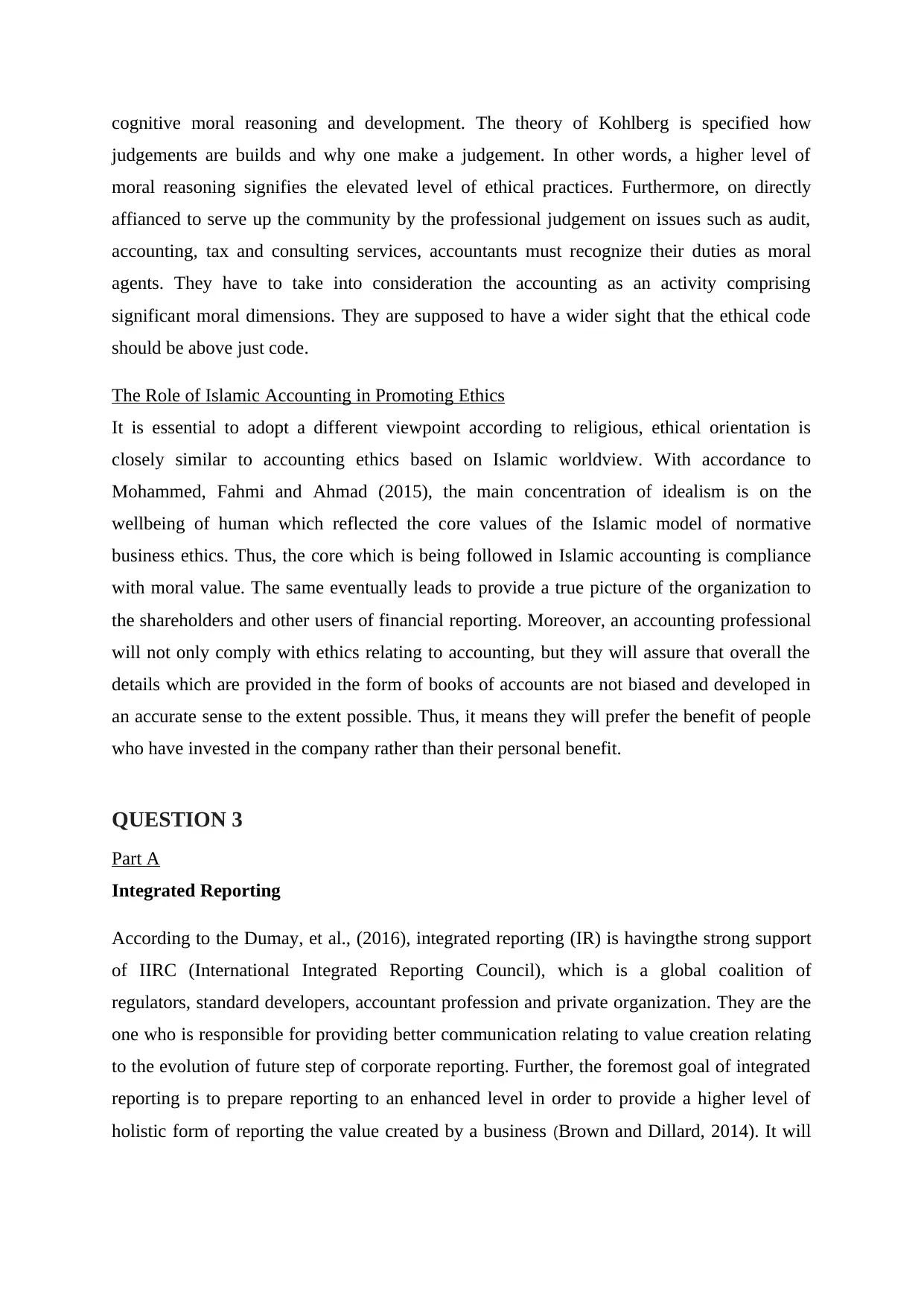
cognitive moral reasoning and development. The theory of Kohlberg is specified how
judgements are builds and why one make a judgement. In other words, a higher level of
moral reasoning signifies the elevated level of ethical practices. Furthermore, on directly
affianced to serve up the community by the professional judgement on issues such as audit,
accounting, tax and consulting services, accountants must recognize their duties as moral
agents. They have to take into consideration the accounting as an activity comprising
significant moral dimensions. They are supposed to have a wider sight that the ethical code
should be above just code.
The Role of Islamic Accounting in Promoting Ethics
It is essential to adopt a different viewpoint according to religious, ethical orientation is
closely similar to accounting ethics based on Islamic worldview. With accordance to
Mohammed, Fahmi and Ahmad (2015), the main concentration of idealism is on the
wellbeing of human which reflected the core values of the Islamic model of normative
business ethics. Thus, the core which is being followed in Islamic accounting is compliance
with moral value. The same eventually leads to provide a true picture of the organization to
the shareholders and other users of financial reporting. Moreover, an accounting professional
will not only comply with ethics relating to accounting, but they will assure that overall the
details which are provided in the form of books of accounts are not biased and developed in
an accurate sense to the extent possible. Thus, it means they will prefer the benefit of people
who have invested in the company rather than their personal benefit.
QUESTION 3
Part A
Integrated Reporting
According to the Dumay, et al., (2016), integrated reporting (IR) is havingthe strong support
of IIRC (International Integrated Reporting Council), which is a global coalition of
regulators, standard developers, accountant profession and private organization. They are the
one who is responsible for providing better communication relating to value creation relating
to the evolution of future step of corporate reporting. Further, the foremost goal of integrated
reporting is to prepare reporting to an enhanced level in order to provide a higher level of
holistic form of reporting the value created by a business (Brown and Dillard, 2014). It will
judgements are builds and why one make a judgement. In other words, a higher level of
moral reasoning signifies the elevated level of ethical practices. Furthermore, on directly
affianced to serve up the community by the professional judgement on issues such as audit,
accounting, tax and consulting services, accountants must recognize their duties as moral
agents. They have to take into consideration the accounting as an activity comprising
significant moral dimensions. They are supposed to have a wider sight that the ethical code
should be above just code.
The Role of Islamic Accounting in Promoting Ethics
It is essential to adopt a different viewpoint according to religious, ethical orientation is
closely similar to accounting ethics based on Islamic worldview. With accordance to
Mohammed, Fahmi and Ahmad (2015), the main concentration of idealism is on the
wellbeing of human which reflected the core values of the Islamic model of normative
business ethics. Thus, the core which is being followed in Islamic accounting is compliance
with moral value. The same eventually leads to provide a true picture of the organization to
the shareholders and other users of financial reporting. Moreover, an accounting professional
will not only comply with ethics relating to accounting, but they will assure that overall the
details which are provided in the form of books of accounts are not biased and developed in
an accurate sense to the extent possible. Thus, it means they will prefer the benefit of people
who have invested in the company rather than their personal benefit.
QUESTION 3
Part A
Integrated Reporting
According to the Dumay, et al., (2016), integrated reporting (IR) is havingthe strong support
of IIRC (International Integrated Reporting Council), which is a global coalition of
regulators, standard developers, accountant profession and private organization. They are the
one who is responsible for providing better communication relating to value creation relating
to the evolution of future step of corporate reporting. Further, the foremost goal of integrated
reporting is to prepare reporting to an enhanced level in order to provide a higher level of
holistic form of reporting the value created by a business (Brown and Dillard, 2014). It will
You're viewing a preview
Unlock full access by subscribing today!
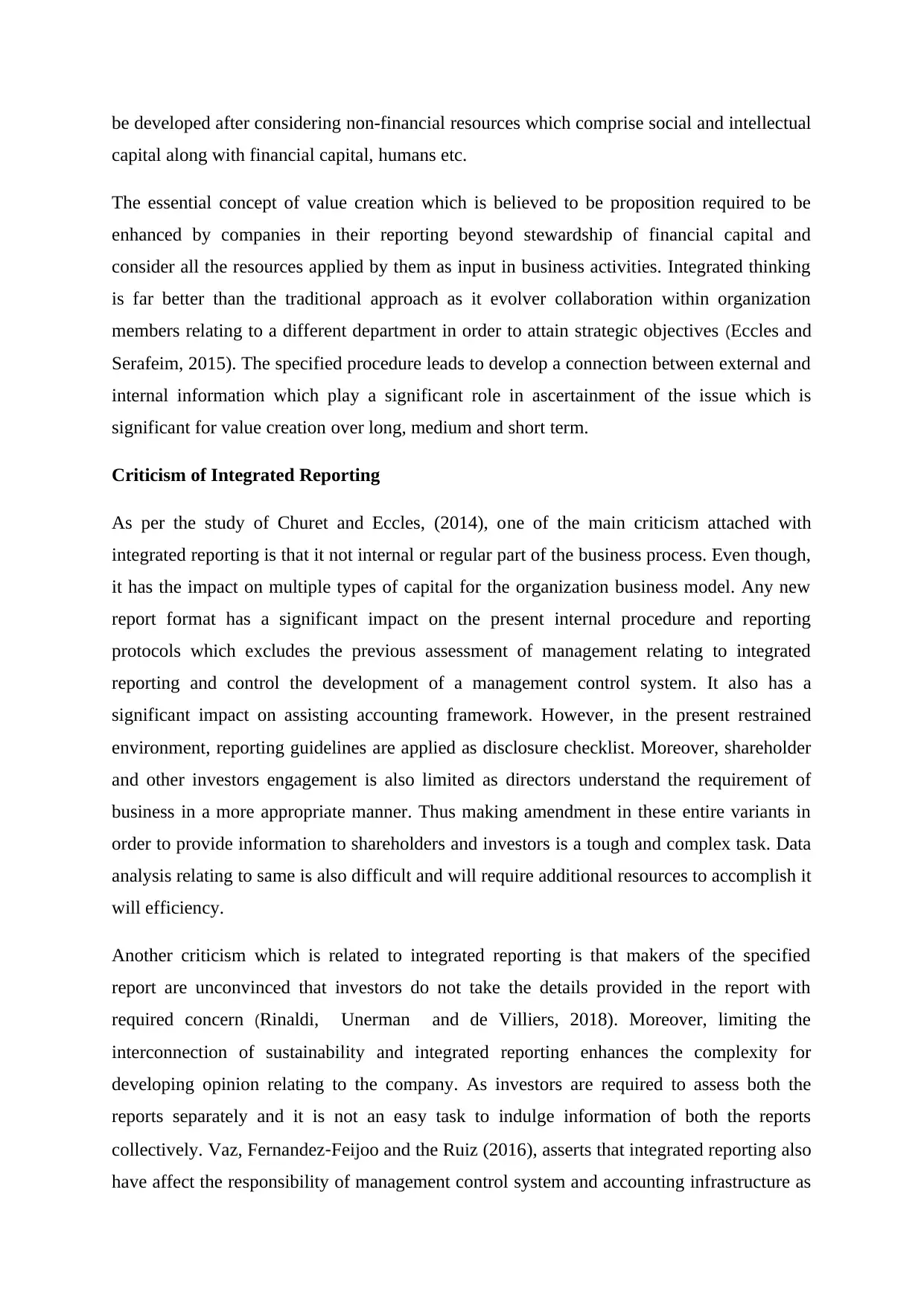
be developed after considering non-financial resources which comprise social and intellectual
capital along with financial capital, humans etc.
The essential concept of value creation which is believed to be proposition required to be
enhanced by companies in their reporting beyond stewardship of financial capital and
consider all the resources applied by them as input in business activities. Integrated thinking
is far better than the traditional approach as it evolver collaboration within organization
members relating to a different department in order to attain strategic objectives (Eccles and
Serafeim, 2015). The specified procedure leads to develop a connection between external and
internal information which play a significant role in ascertainment of the issue which is
significant for value creation over long, medium and short term.
Criticism of Integrated Reporting
As per the study of Churet and Eccles, (2014), one of the main criticism attached with
integrated reporting is that it not internal or regular part of the business process. Even though,
it has the impact on multiple types of capital for the organization business model. Any new
report format has a significant impact on the present internal procedure and reporting
protocols which excludes the previous assessment of management relating to integrated
reporting and control the development of a management control system. It also has a
significant impact on assisting accounting framework. However, in the present restrained
environment, reporting guidelines are applied as disclosure checklist. Moreover, shareholder
and other investors engagement is also limited as directors understand the requirement of
business in a more appropriate manner. Thus making amendment in these entire variants in
order to provide information to shareholders and investors is a tough and complex task. Data
analysis relating to same is also difficult and will require additional resources to accomplish it
will efficiency.
Another criticism which is related to integrated reporting is that makers of the specified
report are unconvinced that investors do not take the details provided in the report with
required concern (Rinaldi, Unerman and de Villiers, 2018). Moreover, limiting the
interconnection of sustainability and integrated reporting enhances the complexity for
developing opinion relating to the company. As investors are required to assess both the
reports separately and it is not an easy task to indulge information of both the reports
collectively. Vaz, Fernandez‐Feijoo and the Ruiz (2016), asserts that integrated reporting also
have affect the responsibility of management control system and accounting infrastructure as
capital along with financial capital, humans etc.
The essential concept of value creation which is believed to be proposition required to be
enhanced by companies in their reporting beyond stewardship of financial capital and
consider all the resources applied by them as input in business activities. Integrated thinking
is far better than the traditional approach as it evolver collaboration within organization
members relating to a different department in order to attain strategic objectives (Eccles and
Serafeim, 2015). The specified procedure leads to develop a connection between external and
internal information which play a significant role in ascertainment of the issue which is
significant for value creation over long, medium and short term.
Criticism of Integrated Reporting
As per the study of Churet and Eccles, (2014), one of the main criticism attached with
integrated reporting is that it not internal or regular part of the business process. Even though,
it has the impact on multiple types of capital for the organization business model. Any new
report format has a significant impact on the present internal procedure and reporting
protocols which excludes the previous assessment of management relating to integrated
reporting and control the development of a management control system. It also has a
significant impact on assisting accounting framework. However, in the present restrained
environment, reporting guidelines are applied as disclosure checklist. Moreover, shareholder
and other investors engagement is also limited as directors understand the requirement of
business in a more appropriate manner. Thus making amendment in these entire variants in
order to provide information to shareholders and investors is a tough and complex task. Data
analysis relating to same is also difficult and will require additional resources to accomplish it
will efficiency.
Another criticism which is related to integrated reporting is that makers of the specified
report are unconvinced that investors do not take the details provided in the report with
required concern (Rinaldi, Unerman and de Villiers, 2018). Moreover, limiting the
interconnection of sustainability and integrated reporting enhances the complexity for
developing opinion relating to the company. As investors are required to assess both the
reports separately and it is not an easy task to indulge information of both the reports
collectively. Vaz, Fernandez‐Feijoo and the Ruiz (2016), asserts that integrated reporting also
have affect the responsibility of management control system and accounting infrastructure as
Paraphrase This Document
Need a fresh take? Get an instant paraphrase of this document with our AI Paraphraser
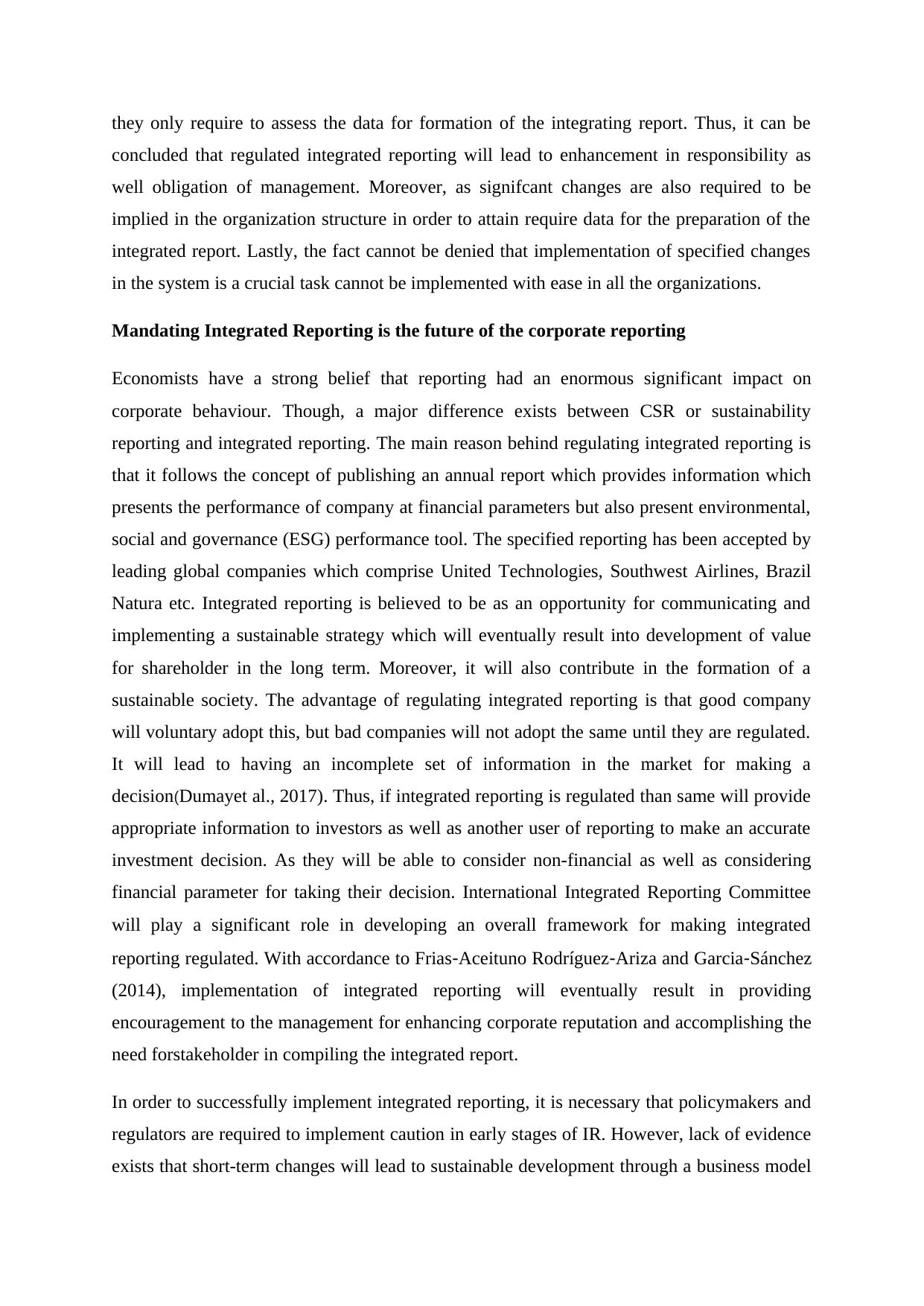
they only require to assess the data for formation of the integrating report. Thus, it can be
concluded that regulated integrated reporting will lead to enhancement in responsibility as
well obligation of management. Moreover, as signifcant changes are also required to be
implied in the organization structure in order to attain require data for the preparation of the
integrated report. Lastly, the fact cannot be denied that implementation of specified changes
in the system is a crucial task cannot be implemented with ease in all the organizations.
Mandating Integrated Reporting is the future of the corporate reporting
Economists have a strong belief that reporting had an enormous significant impact on
corporate behaviour. Though, a major difference exists between CSR or sustainability
reporting and integrated reporting. The main reason behind regulating integrated reporting is
that it follows the concept of publishing an annual report which provides information which
presents the performance of company at financial parameters but also present environmental,
social and governance (ESG) performance tool. The specified reporting has been accepted by
leading global companies which comprise United Technologies, Southwest Airlines, Brazil
Natura etc. Integrated reporting is believed to be as an opportunity for communicating and
implementing a sustainable strategy which will eventually result into development of value
for shareholder in the long term. Moreover, it will also contribute in the formation of a
sustainable society. The advantage of regulating integrated reporting is that good company
will voluntary adopt this, but bad companies will not adopt the same until they are regulated.
It will lead to having an incomplete set of information in the market for making a
decision(Dumayet al., 2017). Thus, if integrated reporting is regulated than same will provide
appropriate information to investors as well as another user of reporting to make an accurate
investment decision. As they will be able to consider non-financial as well as considering
financial parameter for taking their decision. International Integrated Reporting Committee
will play a significant role in developing an overall framework for making integrated
reporting regulated. With accordance to Frias‐Aceituno Rodríguez‐Ariza and Garcia‐Sánchez
(2014), implementation of integrated reporting will eventually result in providing
encouragement to the management for enhancing corporate reputation and accomplishing the
need forstakeholder in compiling the integrated report.
In order to successfully implement integrated reporting, it is necessary that policymakers and
regulators are required to implement caution in early stages of IR. However, lack of evidence
exists that short-term changes will lead to sustainable development through a business model
concluded that regulated integrated reporting will lead to enhancement in responsibility as
well obligation of management. Moreover, as signifcant changes are also required to be
implied in the organization structure in order to attain require data for the preparation of the
integrated report. Lastly, the fact cannot be denied that implementation of specified changes
in the system is a crucial task cannot be implemented with ease in all the organizations.
Mandating Integrated Reporting is the future of the corporate reporting
Economists have a strong belief that reporting had an enormous significant impact on
corporate behaviour. Though, a major difference exists between CSR or sustainability
reporting and integrated reporting. The main reason behind regulating integrated reporting is
that it follows the concept of publishing an annual report which provides information which
presents the performance of company at financial parameters but also present environmental,
social and governance (ESG) performance tool. The specified reporting has been accepted by
leading global companies which comprise United Technologies, Southwest Airlines, Brazil
Natura etc. Integrated reporting is believed to be as an opportunity for communicating and
implementing a sustainable strategy which will eventually result into development of value
for shareholder in the long term. Moreover, it will also contribute in the formation of a
sustainable society. The advantage of regulating integrated reporting is that good company
will voluntary adopt this, but bad companies will not adopt the same until they are regulated.
It will lead to having an incomplete set of information in the market for making a
decision(Dumayet al., 2017). Thus, if integrated reporting is regulated than same will provide
appropriate information to investors as well as another user of reporting to make an accurate
investment decision. As they will be able to consider non-financial as well as considering
financial parameter for taking their decision. International Integrated Reporting Committee
will play a significant role in developing an overall framework for making integrated
reporting regulated. With accordance to Frias‐Aceituno Rodríguez‐Ariza and Garcia‐Sánchez
(2014), implementation of integrated reporting will eventually result in providing
encouragement to the management for enhancing corporate reputation and accomplishing the
need forstakeholder in compiling the integrated report.
In order to successfully implement integrated reporting, it is necessary that policymakers and
regulators are required to implement caution in early stages of IR. However, lack of evidence
exists that short-term changes will lead to sustainable development through a business model
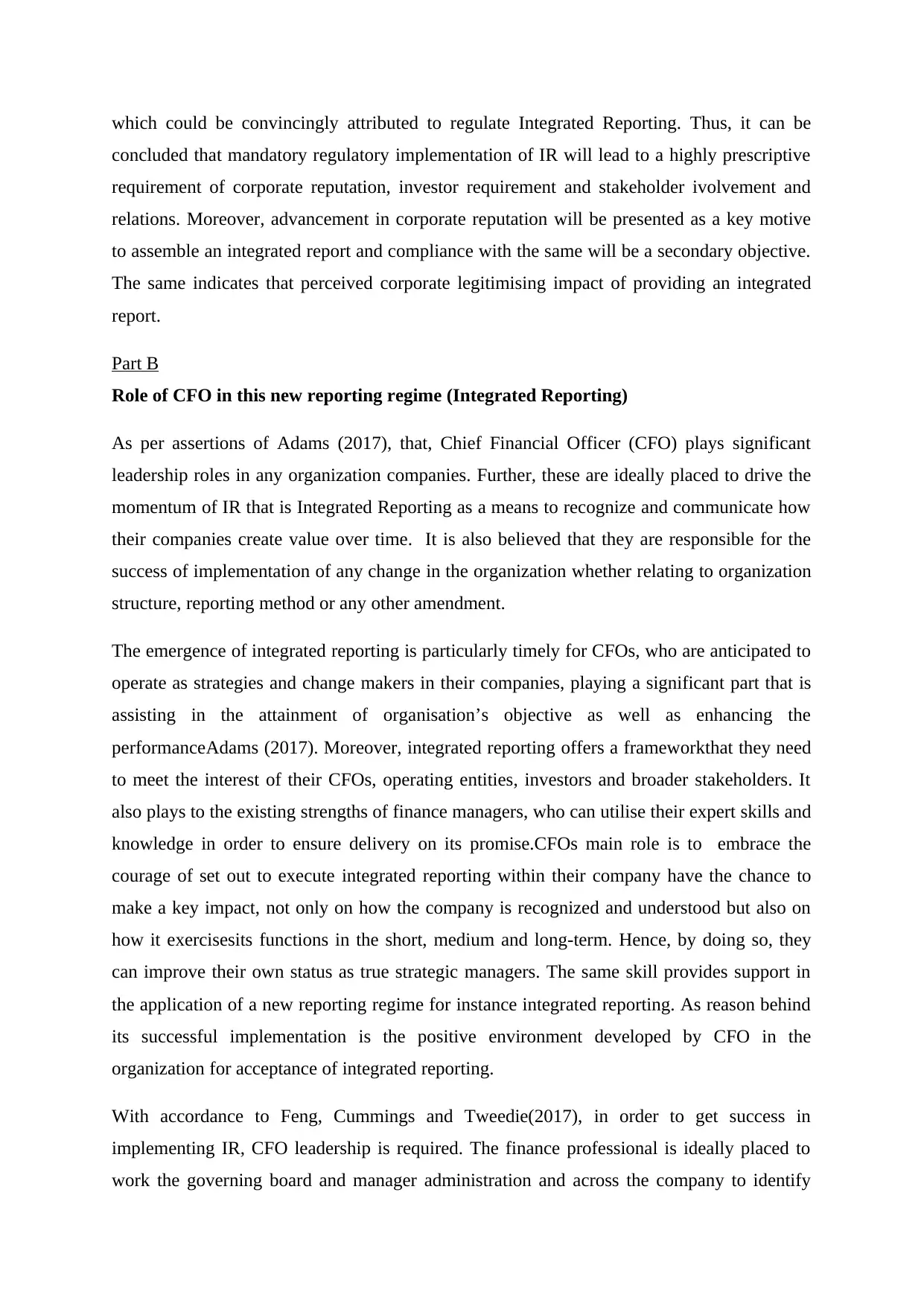
which could be convincingly attributed to regulate Integrated Reporting. Thus, it can be
concluded that mandatory regulatory implementation of IR will lead to a highly prescriptive
requirement of corporate reputation, investor requirement and stakeholder ivolvement and
relations. Moreover, advancement in corporate reputation will be presented as a key motive
to assemble an integrated report and compliance with the same will be a secondary objective.
The same indicates that perceived corporate legitimising impact of providing an integrated
report.
Part B
Role of CFO in this new reporting regime (Integrated Reporting)
As per assertions of Adams (2017), that, Chief Financial Officer (CFO) plays significant
leadership roles in any organization companies. Further, these are ideally placed to drive the
momentum of IR that is Integrated Reporting as a means to recognize and communicate how
their companies create value over time. It is also believed that they are responsible for the
success of implementation of any change in the organization whether relating to organization
structure, reporting method or any other amendment.
The emergence of integrated reporting is particularly timely for CFOs, who are anticipated to
operate as strategies and change makers in their companies, playing a significant part that is
assisting in the attainment of organisation’s objective as well as enhancing the
performanceAdams (2017). Moreover, integrated reporting offers a frameworkthat they need
to meet the interest of their CFOs, operating entities, investors and broader stakeholders. It
also plays to the existing strengths of finance managers, who can utilise their expert skills and
knowledge in order to ensure delivery on its promise.CFOs main role is to embrace the
courage of set out to execute integrated reporting within their company have the chance to
make a key impact, not only on how the company is recognized and understood but also on
how it exercisesits functions in the short, medium and long-term. Hence, by doing so, they
can improve their own status as true strategic managers. The same skill provides support in
the application of a new reporting regime for instance integrated reporting. As reason behind
its successful implementation is the positive environment developed by CFO in the
organization for acceptance of integrated reporting.
With accordance to Feng, Cummings and Tweedie(2017), in order to get success in
implementing IR, CFO leadership is required. The finance professional is ideally placed to
work the governing board and manager administration and across the company to identify
concluded that mandatory regulatory implementation of IR will lead to a highly prescriptive
requirement of corporate reputation, investor requirement and stakeholder ivolvement and
relations. Moreover, advancement in corporate reputation will be presented as a key motive
to assemble an integrated report and compliance with the same will be a secondary objective.
The same indicates that perceived corporate legitimising impact of providing an integrated
report.
Part B
Role of CFO in this new reporting regime (Integrated Reporting)
As per assertions of Adams (2017), that, Chief Financial Officer (CFO) plays significant
leadership roles in any organization companies. Further, these are ideally placed to drive the
momentum of IR that is Integrated Reporting as a means to recognize and communicate how
their companies create value over time. It is also believed that they are responsible for the
success of implementation of any change in the organization whether relating to organization
structure, reporting method or any other amendment.
The emergence of integrated reporting is particularly timely for CFOs, who are anticipated to
operate as strategies and change makers in their companies, playing a significant part that is
assisting in the attainment of organisation’s objective as well as enhancing the
performanceAdams (2017). Moreover, integrated reporting offers a frameworkthat they need
to meet the interest of their CFOs, operating entities, investors and broader stakeholders. It
also plays to the existing strengths of finance managers, who can utilise their expert skills and
knowledge in order to ensure delivery on its promise.CFOs main role is to embrace the
courage of set out to execute integrated reporting within their company have the chance to
make a key impact, not only on how the company is recognized and understood but also on
how it exercisesits functions in the short, medium and long-term. Hence, by doing so, they
can improve their own status as true strategic managers. The same skill provides support in
the application of a new reporting regime for instance integrated reporting. As reason behind
its successful implementation is the positive environment developed by CFO in the
organization for acceptance of integrated reporting.
With accordance to Feng, Cummings and Tweedie(2017), in order to get success in
implementing IR, CFO leadership is required. The finance professional is ideally placed to
work the governing board and manager administration and across the company to identify
You're viewing a preview
Unlock full access by subscribing today!
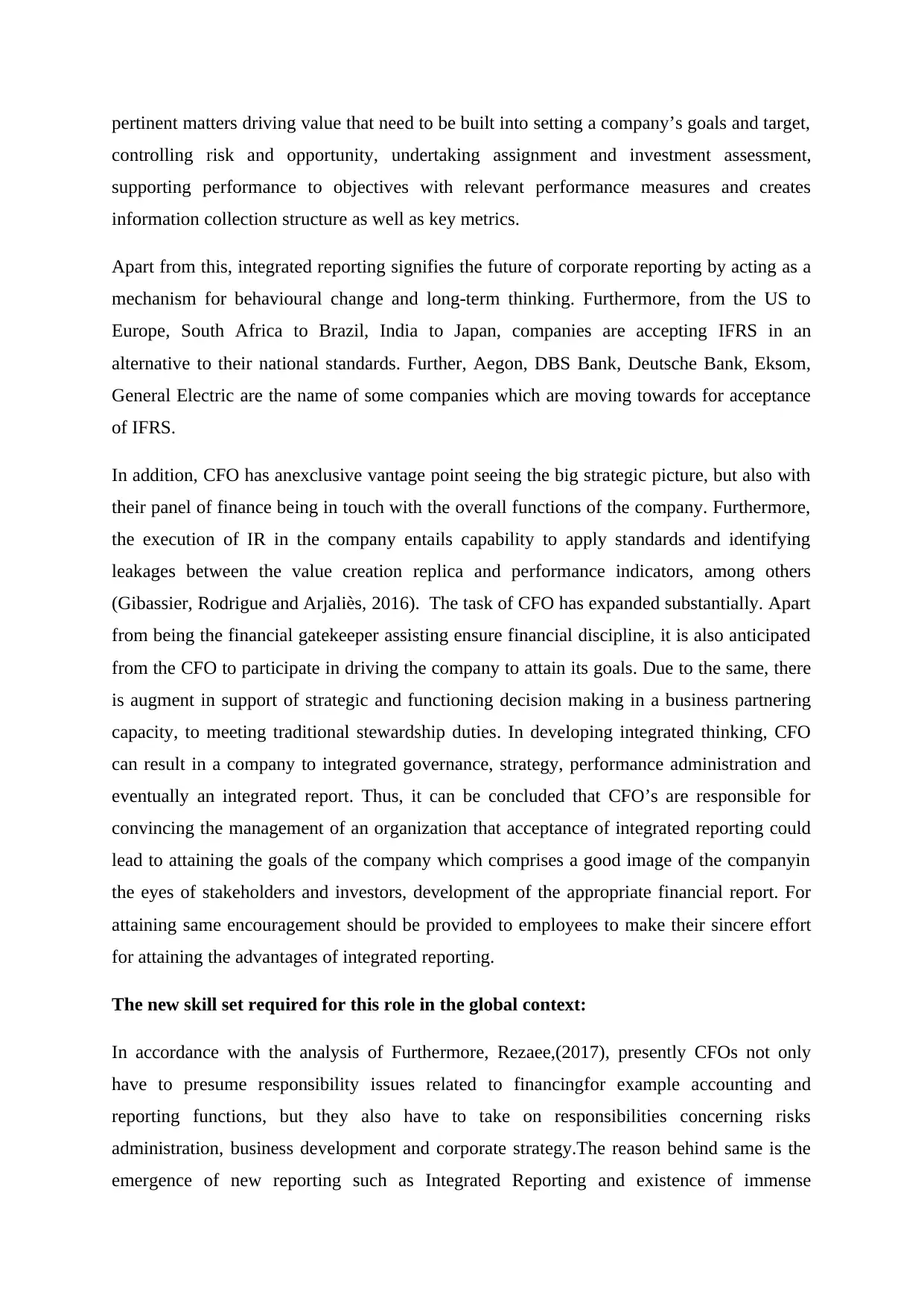
pertinent matters driving value that need to be built into setting a company’s goals and target,
controlling risk and opportunity, undertaking assignment and investment assessment,
supporting performance to objectives with relevant performance measures and creates
information collection structure as well as key metrics.
Apart from this, integrated reporting signifies the future of corporate reporting by acting as a
mechanism for behavioural change and long-term thinking. Furthermore, from the US to
Europe, South Africa to Brazil, India to Japan, companies are accepting IFRS in an
alternative to their national standards. Further, Aegon, DBS Bank, Deutsche Bank, Eksom,
General Electric are the name of some companies which are moving towards for acceptance
of IFRS.
In addition, CFO has anexclusive vantage point seeing the big strategic picture, but also with
their panel of finance being in touch with the overall functions of the company. Furthermore,
the execution of IR in the company entails capability to apply standards and identifying
leakages between the value creation replica and performance indicators, among others
(Gibassier, Rodrigue and Arjaliès, 2016). The task of CFO has expanded substantially. Apart
from being the financial gatekeeper assisting ensure financial discipline, it is also anticipated
from the CFO to participate in driving the company to attain its goals. Due to the same, there
is augment in support of strategic and functioning decision making in a business partnering
capacity, to meeting traditional stewardship duties. In developing integrated thinking, CFO
can result in a company to integrated governance, strategy, performance administration and
eventually an integrated report. Thus, it can be concluded that CFO’s are responsible for
convincing the management of an organization that acceptance of integrated reporting could
lead to attaining the goals of the company which comprises a good image of the companyin
the eyes of stakeholders and investors, development of the appropriate financial report. For
attaining same encouragement should be provided to employees to make their sincere effort
for attaining the advantages of integrated reporting.
The new skill set required for this role in the global context:
In accordance with the analysis of Furthermore, Rezaee,(2017), presently CFOs not only
have to presume responsibility issues related to financingfor example accounting and
reporting functions, but they also have to take on responsibilities concerning risks
administration, business development and corporate strategy.The reason behind same is the
emergence of new reporting such as Integrated Reporting and existence of immense
controlling risk and opportunity, undertaking assignment and investment assessment,
supporting performance to objectives with relevant performance measures and creates
information collection structure as well as key metrics.
Apart from this, integrated reporting signifies the future of corporate reporting by acting as a
mechanism for behavioural change and long-term thinking. Furthermore, from the US to
Europe, South Africa to Brazil, India to Japan, companies are accepting IFRS in an
alternative to their national standards. Further, Aegon, DBS Bank, Deutsche Bank, Eksom,
General Electric are the name of some companies which are moving towards for acceptance
of IFRS.
In addition, CFO has anexclusive vantage point seeing the big strategic picture, but also with
their panel of finance being in touch with the overall functions of the company. Furthermore,
the execution of IR in the company entails capability to apply standards and identifying
leakages between the value creation replica and performance indicators, among others
(Gibassier, Rodrigue and Arjaliès, 2016). The task of CFO has expanded substantially. Apart
from being the financial gatekeeper assisting ensure financial discipline, it is also anticipated
from the CFO to participate in driving the company to attain its goals. Due to the same, there
is augment in support of strategic and functioning decision making in a business partnering
capacity, to meeting traditional stewardship duties. In developing integrated thinking, CFO
can result in a company to integrated governance, strategy, performance administration and
eventually an integrated report. Thus, it can be concluded that CFO’s are responsible for
convincing the management of an organization that acceptance of integrated reporting could
lead to attaining the goals of the company which comprises a good image of the companyin
the eyes of stakeholders and investors, development of the appropriate financial report. For
attaining same encouragement should be provided to employees to make their sincere effort
for attaining the advantages of integrated reporting.
The new skill set required for this role in the global context:
In accordance with the analysis of Furthermore, Rezaee,(2017), presently CFOs not only
have to presume responsibility issues related to financingfor example accounting and
reporting functions, but they also have to take on responsibilities concerning risks
administration, business development and corporate strategy.The reason behind same is the
emergence of new reporting such as Integrated Reporting and existence of immense
Paraphrase This Document
Need a fresh take? Get an instant paraphrase of this document with our AI Paraphraser
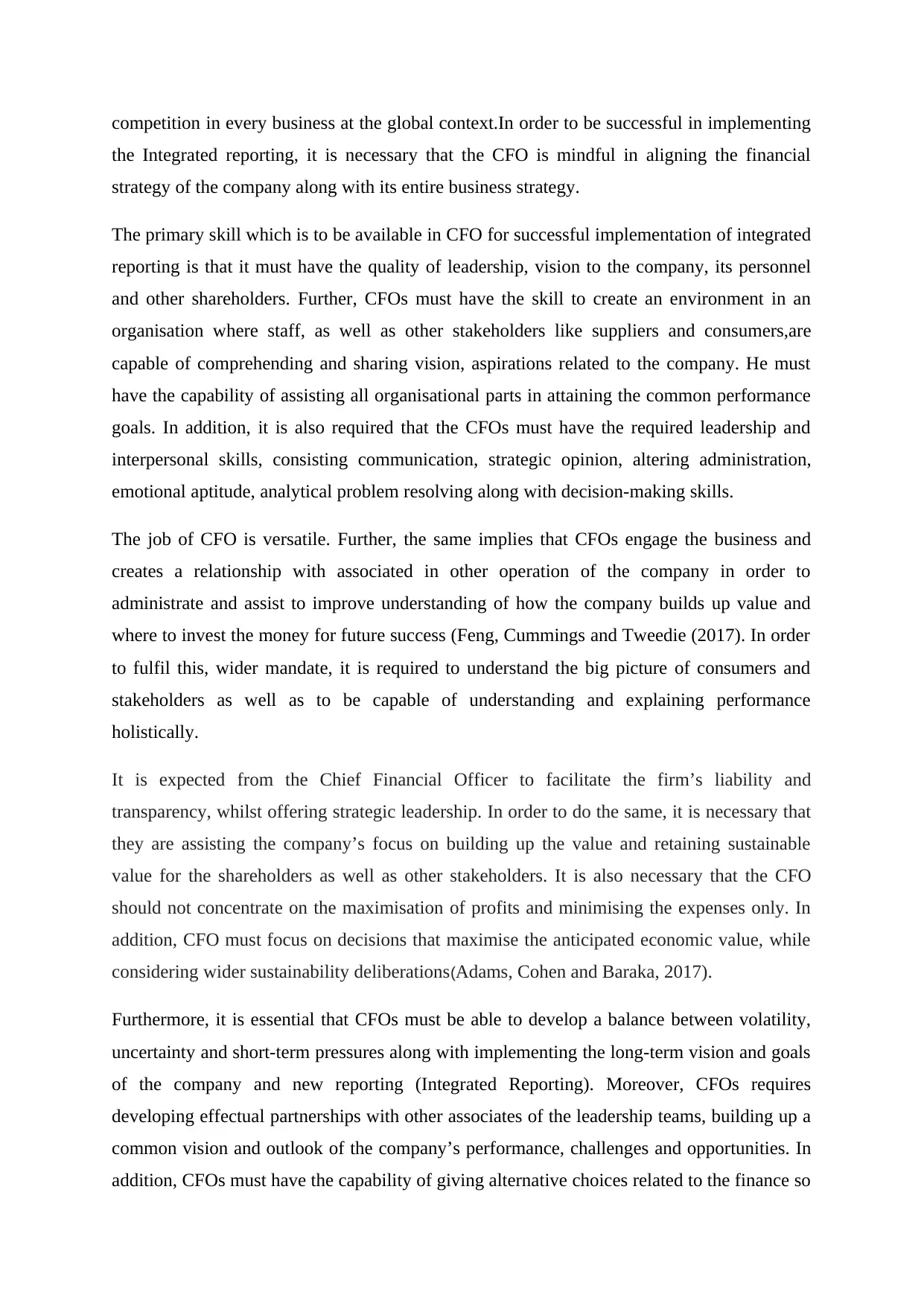
competition in every business at the global context.In order to be successful in implementing
the Integrated reporting, it is necessary that the CFO is mindful in aligning the financial
strategy of the company along with its entire business strategy.
The primary skill which is to be available in CFO for successful implementation of integrated
reporting is that it must have the quality of leadership, vision to the company, its personnel
and other shareholders. Further, CFOs must have the skill to create an environment in an
organisation where staff, as well as other stakeholders like suppliers and consumers,are
capable of comprehending and sharing vision, aspirations related to the company. He must
have the capability of assisting all organisational parts in attaining the common performance
goals. In addition, it is also required that the CFOs must have the required leadership and
interpersonal skills, consisting communication, strategic opinion, altering administration,
emotional aptitude, analytical problem resolving along with decision-making skills.
The job of CFO is versatile. Further, the same implies that CFOs engage the business and
creates a relationship with associated in other operation of the company in order to
administrate and assist to improve understanding of how the company builds up value and
where to invest the money for future success (Feng, Cummings and Tweedie (2017). In order
to fulfil this, wider mandate, it is required to understand the big picture of consumers and
stakeholders as well as to be capable of understanding and explaining performance
holistically.
It is expected from the Chief Financial Officer to facilitate the firm’s liability and
transparency, whilst offering strategic leadership. In order to do the same, it is necessary that
they are assisting the company’s focus on building up the value and retaining sustainable
value for the shareholders as well as other stakeholders. It is also necessary that the CFO
should not concentrate on the maximisation of profits and minimising the expenses only. In
addition, CFO must focus on decisions that maximise the anticipated economic value, while
considering wider sustainability deliberations(Adams, Cohen and Baraka, 2017).
Furthermore, it is essential that CFOs must be able to develop a balance between volatility,
uncertainty and short-term pressures along with implementing the long-term vision and goals
of the company and new reporting (Integrated Reporting). Moreover, CFOs requires
developing effectual partnerships with other associates of the leadership teams, building up a
common vision and outlook of the company’s performance, challenges and opportunities. In
addition, CFOs must have the capability of giving alternative choices related to the finance so
the Integrated reporting, it is necessary that the CFO is mindful in aligning the financial
strategy of the company along with its entire business strategy.
The primary skill which is to be available in CFO for successful implementation of integrated
reporting is that it must have the quality of leadership, vision to the company, its personnel
and other shareholders. Further, CFOs must have the skill to create an environment in an
organisation where staff, as well as other stakeholders like suppliers and consumers,are
capable of comprehending and sharing vision, aspirations related to the company. He must
have the capability of assisting all organisational parts in attaining the common performance
goals. In addition, it is also required that the CFOs must have the required leadership and
interpersonal skills, consisting communication, strategic opinion, altering administration,
emotional aptitude, analytical problem resolving along with decision-making skills.
The job of CFO is versatile. Further, the same implies that CFOs engage the business and
creates a relationship with associated in other operation of the company in order to
administrate and assist to improve understanding of how the company builds up value and
where to invest the money for future success (Feng, Cummings and Tweedie (2017). In order
to fulfil this, wider mandate, it is required to understand the big picture of consumers and
stakeholders as well as to be capable of understanding and explaining performance
holistically.
It is expected from the Chief Financial Officer to facilitate the firm’s liability and
transparency, whilst offering strategic leadership. In order to do the same, it is necessary that
they are assisting the company’s focus on building up the value and retaining sustainable
value for the shareholders as well as other stakeholders. It is also necessary that the CFO
should not concentrate on the maximisation of profits and minimising the expenses only. In
addition, CFO must focus on decisions that maximise the anticipated economic value, while
considering wider sustainability deliberations(Adams, Cohen and Baraka, 2017).
Furthermore, it is essential that CFOs must be able to develop a balance between volatility,
uncertainty and short-term pressures along with implementing the long-term vision and goals
of the company and new reporting (Integrated Reporting). Moreover, CFOs requires
developing effectual partnerships with other associates of the leadership teams, building up a
common vision and outlook of the company’s performance, challenges and opportunities. In
addition, CFOs must have the capability of giving alternative choices related to the finance so
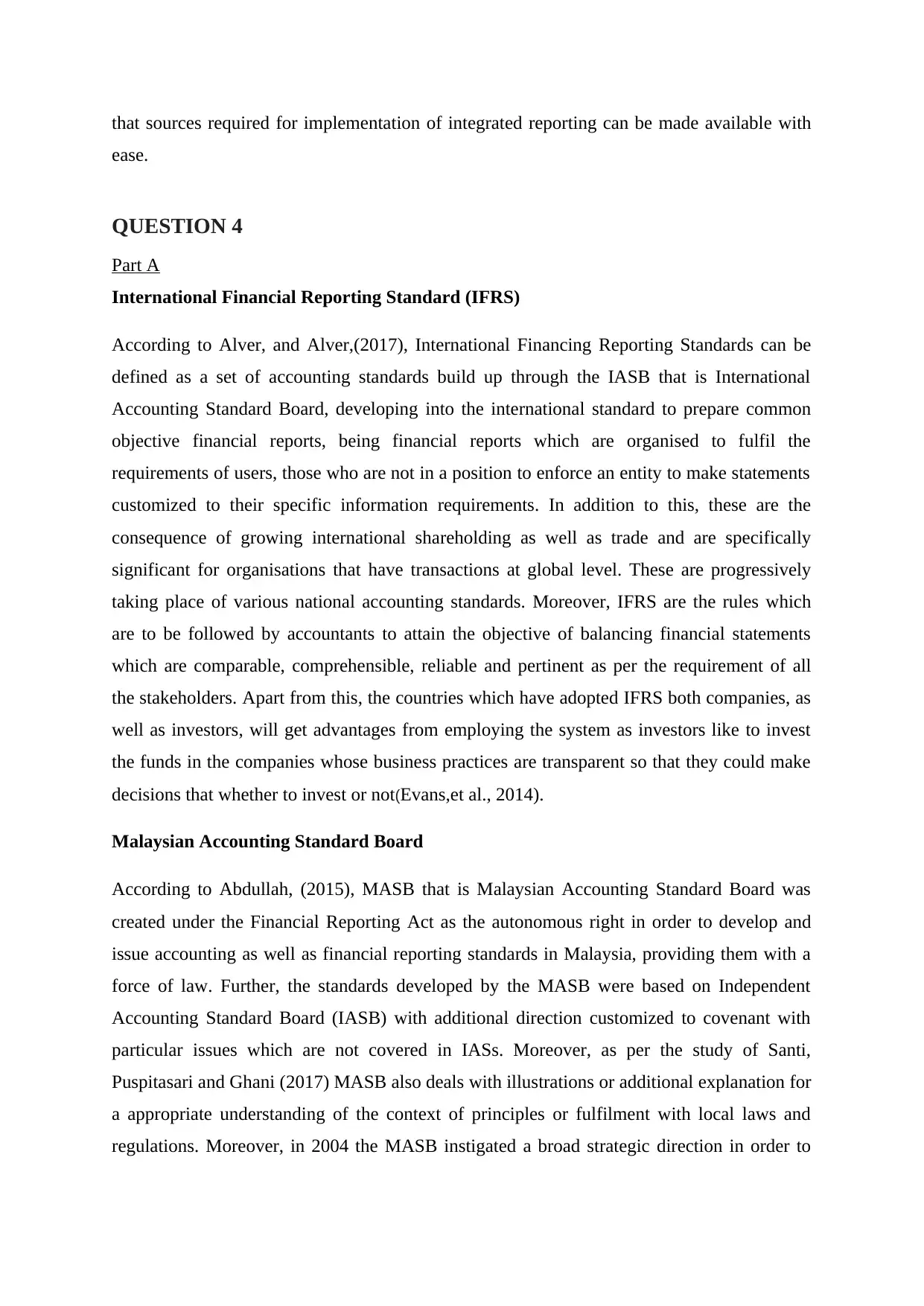
that sources required for implementation of integrated reporting can be made available with
ease.
QUESTION 4
Part A
International Financial Reporting Standard (IFRS)
According to Alver, and Alver,(2017), International Financing Reporting Standards can be
defined as a set of accounting standards build up through the IASB that is International
Accounting Standard Board, developing into the international standard to prepare common
objective financial reports, being financial reports which are organised to fulfil the
requirements of users, those who are not in a position to enforce an entity to make statements
customized to their specific information requirements. In addition to this, these are the
consequence of growing international shareholding as well as trade and are specifically
significant for organisations that have transactions at global level. These are progressively
taking place of various national accounting standards. Moreover, IFRS are the rules which
are to be followed by accountants to attain the objective of balancing financial statements
which are comparable, comprehensible, reliable and pertinent as per the requirement of all
the stakeholders. Apart from this, the countries which have adopted IFRS both companies, as
well as investors, will get advantages from employing the system as investors like to invest
the funds in the companies whose business practices are transparent so that they could make
decisions that whether to invest or not(Evans,et al., 2014).
Malaysian Accounting Standard Board
According to Abdullah, (2015), MASB that is Malaysian Accounting Standard Board was
created under the Financial Reporting Act as the autonomous right in order to develop and
issue accounting as well as financial reporting standards in Malaysia, providing them with a
force of law. Further, the standards developed by the MASB were based on Independent
Accounting Standard Board (IASB) with additional direction customized to covenant with
particular issues which are not covered in IASs. Moreover, as per the study of Santi,
Puspitasari and Ghani (2017) MASB also deals with illustrations or additional explanation for
a appropriate understanding of the context of principles or fulfilment with local laws and
regulations. Moreover, in 2004 the MASB instigated a broad strategic direction in order to
ease.
QUESTION 4
Part A
International Financial Reporting Standard (IFRS)
According to Alver, and Alver,(2017), International Financing Reporting Standards can be
defined as a set of accounting standards build up through the IASB that is International
Accounting Standard Board, developing into the international standard to prepare common
objective financial reports, being financial reports which are organised to fulfil the
requirements of users, those who are not in a position to enforce an entity to make statements
customized to their specific information requirements. In addition to this, these are the
consequence of growing international shareholding as well as trade and are specifically
significant for organisations that have transactions at global level. These are progressively
taking place of various national accounting standards. Moreover, IFRS are the rules which
are to be followed by accountants to attain the objective of balancing financial statements
which are comparable, comprehensible, reliable and pertinent as per the requirement of all
the stakeholders. Apart from this, the countries which have adopted IFRS both companies, as
well as investors, will get advantages from employing the system as investors like to invest
the funds in the companies whose business practices are transparent so that they could make
decisions that whether to invest or not(Evans,et al., 2014).
Malaysian Accounting Standard Board
According to Abdullah, (2015), MASB that is Malaysian Accounting Standard Board was
created under the Financial Reporting Act as the autonomous right in order to develop and
issue accounting as well as financial reporting standards in Malaysia, providing them with a
force of law. Further, the standards developed by the MASB were based on Independent
Accounting Standard Board (IASB) with additional direction customized to covenant with
particular issues which are not covered in IASs. Moreover, as per the study of Santi,
Puspitasari and Ghani (2017) MASB also deals with illustrations or additional explanation for
a appropriate understanding of the context of principles or fulfilment with local laws and
regulations. Moreover, in 2004 the MASB instigated a broad strategic direction in order to
You're viewing a preview
Unlock full access by subscribing today!
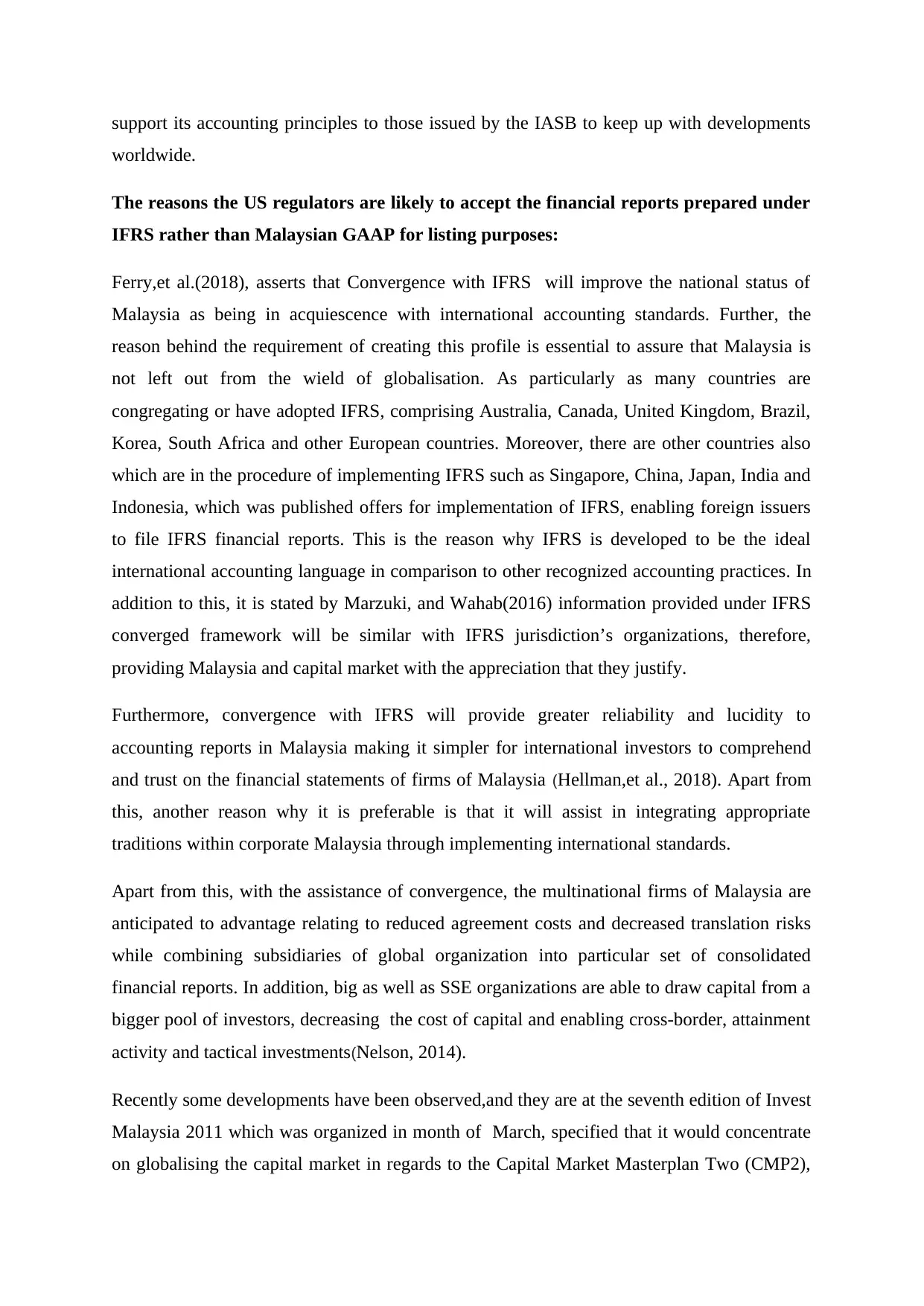
support its accounting principles to those issued by the IASB to keep up with developments
worldwide.
The reasons the US regulators are likely to accept the financial reports prepared under
IFRS rather than Malaysian GAAP for listing purposes:
Ferry,et al.(2018), asserts that Convergence with IFRS will improve the national status of
Malaysia as being in acquiescence with international accounting standards. Further, the
reason behind the requirement of creating this profile is essential to assure that Malaysia is
not left out from the wield of globalisation. As particularly as many countries are
congregating or have adopted IFRS, comprising Australia, Canada, United Kingdom, Brazil,
Korea, South Africa and other European countries. Moreover, there are other countries also
which are in the procedure of implementing IFRS such as Singapore, China, Japan, India and
Indonesia, which was published offers for implementation of IFRS, enabling foreign issuers
to file IFRS financial reports. This is the reason why IFRS is developed to be the ideal
international accounting language in comparison to other recognized accounting practices. In
addition to this, it is stated by Marzuki, and Wahab(2016) information provided under IFRS
converged framework will be similar with IFRS jurisdiction’s organizations, therefore,
providing Malaysia and capital market with the appreciation that they justify.
Furthermore, convergence with IFRS will provide greater reliability and lucidity to
accounting reports in Malaysia making it simpler for international investors to comprehend
and trust on the financial statements of firms of Malaysia (Hellman,et al., 2018). Apart from
this, another reason why it is preferable is that it will assist in integrating appropriate
traditions within corporate Malaysia through implementing international standards.
Apart from this, with the assistance of convergence, the multinational firms of Malaysia are
anticipated to advantage relating to reduced agreement costs and decreased translation risks
while combining subsidiaries of global organization into particular set of consolidated
financial reports. In addition, big as well as SSE organizations are able to draw capital from a
bigger pool of investors, decreasing the cost of capital and enabling cross-border, attainment
activity and tactical investments(Nelson, 2014).
Recently some developments have been observed,and they are at the seventh edition of Invest
Malaysia 2011 which was organized in month of March, specified that it would concentrate
on globalising the capital market in regards to the Capital Market Masterplan Two (CMP2),
worldwide.
The reasons the US regulators are likely to accept the financial reports prepared under
IFRS rather than Malaysian GAAP for listing purposes:
Ferry,et al.(2018), asserts that Convergence with IFRS will improve the national status of
Malaysia as being in acquiescence with international accounting standards. Further, the
reason behind the requirement of creating this profile is essential to assure that Malaysia is
not left out from the wield of globalisation. As particularly as many countries are
congregating or have adopted IFRS, comprising Australia, Canada, United Kingdom, Brazil,
Korea, South Africa and other European countries. Moreover, there are other countries also
which are in the procedure of implementing IFRS such as Singapore, China, Japan, India and
Indonesia, which was published offers for implementation of IFRS, enabling foreign issuers
to file IFRS financial reports. This is the reason why IFRS is developed to be the ideal
international accounting language in comparison to other recognized accounting practices. In
addition to this, it is stated by Marzuki, and Wahab(2016) information provided under IFRS
converged framework will be similar with IFRS jurisdiction’s organizations, therefore,
providing Malaysia and capital market with the appreciation that they justify.
Furthermore, convergence with IFRS will provide greater reliability and lucidity to
accounting reports in Malaysia making it simpler for international investors to comprehend
and trust on the financial statements of firms of Malaysia (Hellman,et al., 2018). Apart from
this, another reason why it is preferable is that it will assist in integrating appropriate
traditions within corporate Malaysia through implementing international standards.
Apart from this, with the assistance of convergence, the multinational firms of Malaysia are
anticipated to advantage relating to reduced agreement costs and decreased translation risks
while combining subsidiaries of global organization into particular set of consolidated
financial reports. In addition, big as well as SSE organizations are able to draw capital from a
bigger pool of investors, decreasing the cost of capital and enabling cross-border, attainment
activity and tactical investments(Nelson, 2014).
Recently some developments have been observed,and they are at the seventh edition of Invest
Malaysia 2011 which was organized in month of March, specified that it would concentrate
on globalising the capital market in regards to the Capital Market Masterplan Two (CMP2),
Paraphrase This Document
Need a fresh take? Get an instant paraphrase of this document with our AI Paraphraser
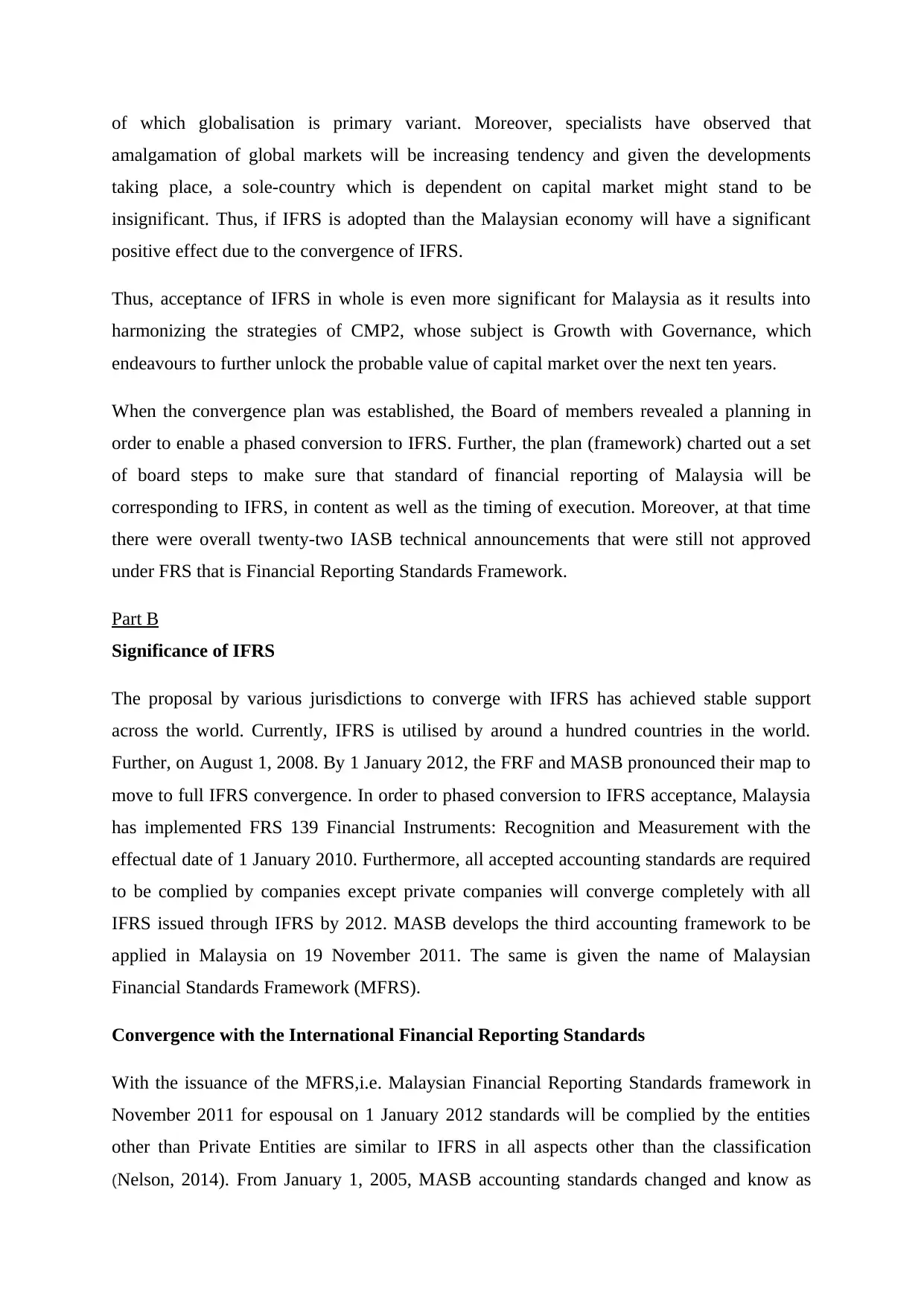
of which globalisation is primary variant. Moreover, specialists have observed that
amalgamation of global markets will be increasing tendency and given the developments
taking place, a sole-country which is dependent on capital market might stand to be
insignificant. Thus, if IFRS is adopted than the Malaysian economy will have a significant
positive effect due to the convergence of IFRS.
Thus, acceptance of IFRS in whole is even more significant for Malaysia as it results into
harmonizing the strategies of CMP2, whose subject is Growth with Governance, which
endeavours to further unlock the probable value of capital market over the next ten years.
When the convergence plan was established, the Board of members revealed a planning in
order to enable a phased conversion to IFRS. Further, the plan (framework) charted out a set
of board steps to make sure that standard of financial reporting of Malaysia will be
corresponding to IFRS, in content as well as the timing of execution. Moreover, at that time
there were overall twenty-two IASB technical announcements that were still not approved
under FRS that is Financial Reporting Standards Framework.
Part B
Significance of IFRS
The proposal by various jurisdictions to converge with IFRS has achieved stable support
across the world. Currently, IFRS is utilised by around a hundred countries in the world.
Further, on August 1, 2008. By 1 January 2012, the FRF and MASB pronounced their map to
move to full IFRS convergence. In order to phased conversion to IFRS acceptance, Malaysia
has implemented FRS 139 Financial Instruments: Recognition and Measurement with the
effectual date of 1 January 2010. Furthermore, all accepted accounting standards are required
to be complied by companies except private companies will converge completely with all
IFRS issued through IFRS by 2012. MASB develops the third accounting framework to be
applied in Malaysia on 19 November 2011. The same is given the name of Malaysian
Financial Standards Framework (MFRS).
Convergence with the International Financial Reporting Standards
With the issuance of the MFRS,i.e. Malaysian Financial Reporting Standards framework in
November 2011 for espousal on 1 January 2012 standards will be complied by the entities
other than Private Entities are similar to IFRS in all aspects other than the classification
(Nelson, 2014). From January 1, 2005, MASB accounting standards changed and know as
amalgamation of global markets will be increasing tendency and given the developments
taking place, a sole-country which is dependent on capital market might stand to be
insignificant. Thus, if IFRS is adopted than the Malaysian economy will have a significant
positive effect due to the convergence of IFRS.
Thus, acceptance of IFRS in whole is even more significant for Malaysia as it results into
harmonizing the strategies of CMP2, whose subject is Growth with Governance, which
endeavours to further unlock the probable value of capital market over the next ten years.
When the convergence plan was established, the Board of members revealed a planning in
order to enable a phased conversion to IFRS. Further, the plan (framework) charted out a set
of board steps to make sure that standard of financial reporting of Malaysia will be
corresponding to IFRS, in content as well as the timing of execution. Moreover, at that time
there were overall twenty-two IASB technical announcements that were still not approved
under FRS that is Financial Reporting Standards Framework.
Part B
Significance of IFRS
The proposal by various jurisdictions to converge with IFRS has achieved stable support
across the world. Currently, IFRS is utilised by around a hundred countries in the world.
Further, on August 1, 2008. By 1 January 2012, the FRF and MASB pronounced their map to
move to full IFRS convergence. In order to phased conversion to IFRS acceptance, Malaysia
has implemented FRS 139 Financial Instruments: Recognition and Measurement with the
effectual date of 1 January 2010. Furthermore, all accepted accounting standards are required
to be complied by companies except private companies will converge completely with all
IFRS issued through IFRS by 2012. MASB develops the third accounting framework to be
applied in Malaysia on 19 November 2011. The same is given the name of Malaysian
Financial Standards Framework (MFRS).
Convergence with the International Financial Reporting Standards
With the issuance of the MFRS,i.e. Malaysian Financial Reporting Standards framework in
November 2011 for espousal on 1 January 2012 standards will be complied by the entities
other than Private Entities are similar to IFRS in all aspects other than the classification
(Nelson, 2014). From January 1, 2005, MASB accounting standards changed and know as
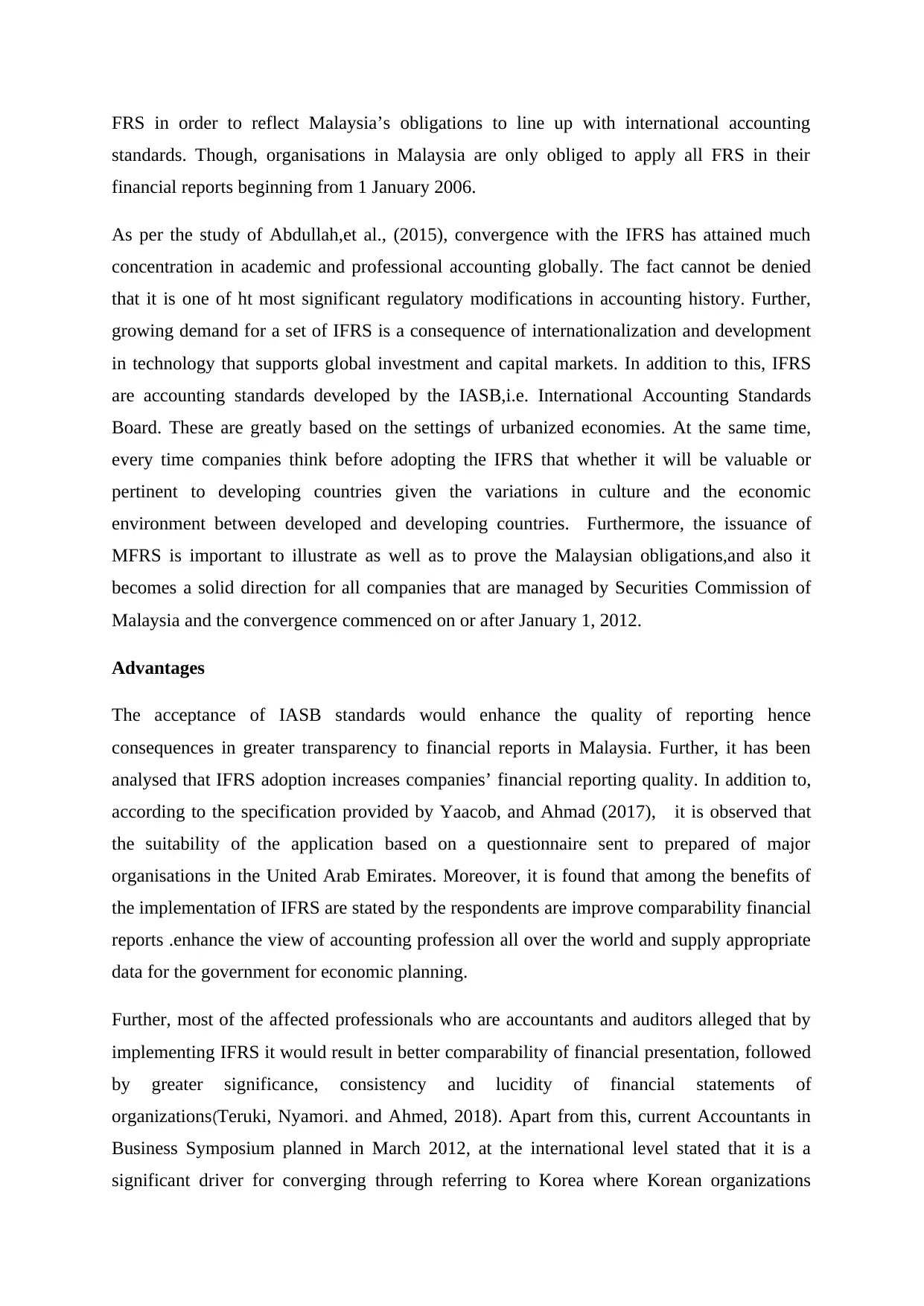
FRS in order to reflect Malaysia’s obligations to line up with international accounting
standards. Though, organisations in Malaysia are only obliged to apply all FRS in their
financial reports beginning from 1 January 2006.
As per the study of Abdullah,et al., (2015), convergence with the IFRS has attained much
concentration in academic and professional accounting globally. The fact cannot be denied
that it is one of ht most significant regulatory modifications in accounting history. Further,
growing demand for a set of IFRS is a consequence of internationalization and development
in technology that supports global investment and capital markets. In addition to this, IFRS
are accounting standards developed by the IASB,i.e. International Accounting Standards
Board. These are greatly based on the settings of urbanized economies. At the same time,
every time companies think before adopting the IFRS that whether it will be valuable or
pertinent to developing countries given the variations in culture and the economic
environment between developed and developing countries. Furthermore, the issuance of
MFRS is important to illustrate as well as to prove the Malaysian obligations,and also it
becomes a solid direction for all companies that are managed by Securities Commission of
Malaysia and the convergence commenced on or after January 1, 2012.
Advantages
The acceptance of IASB standards would enhance the quality of reporting hence
consequences in greater transparency to financial reports in Malaysia. Further, it has been
analysed that IFRS adoption increases companies’ financial reporting quality. In addition to,
according to the specification provided by Yaacob, and Ahmad (2017), it is observed that
the suitability of the application based on a questionnaire sent to prepared of major
organisations in the United Arab Emirates. Moreover, it is found that among the benefits of
the implementation of IFRS are stated by the respondents are improve comparability financial
reports .enhance the view of accounting profession all over the world and supply appropriate
data for the government for economic planning.
Further, most of the affected professionals who are accountants and auditors alleged that by
implementing IFRS it would result in better comparability of financial presentation, followed
by greater significance, consistency and lucidity of financial statements of
organizations(Teruki, Nyamori. and Ahmed, 2018). Apart from this, current Accountants in
Business Symposium planned in March 2012, at the international level stated that it is a
significant driver for converging through referring to Korea where Korean organizations
standards. Though, organisations in Malaysia are only obliged to apply all FRS in their
financial reports beginning from 1 January 2006.
As per the study of Abdullah,et al., (2015), convergence with the IFRS has attained much
concentration in academic and professional accounting globally. The fact cannot be denied
that it is one of ht most significant regulatory modifications in accounting history. Further,
growing demand for a set of IFRS is a consequence of internationalization and development
in technology that supports global investment and capital markets. In addition to this, IFRS
are accounting standards developed by the IASB,i.e. International Accounting Standards
Board. These are greatly based on the settings of urbanized economies. At the same time,
every time companies think before adopting the IFRS that whether it will be valuable or
pertinent to developing countries given the variations in culture and the economic
environment between developed and developing countries. Furthermore, the issuance of
MFRS is important to illustrate as well as to prove the Malaysian obligations,and also it
becomes a solid direction for all companies that are managed by Securities Commission of
Malaysia and the convergence commenced on or after January 1, 2012.
Advantages
The acceptance of IASB standards would enhance the quality of reporting hence
consequences in greater transparency to financial reports in Malaysia. Further, it has been
analysed that IFRS adoption increases companies’ financial reporting quality. In addition to,
according to the specification provided by Yaacob, and Ahmad (2017), it is observed that
the suitability of the application based on a questionnaire sent to prepared of major
organisations in the United Arab Emirates. Moreover, it is found that among the benefits of
the implementation of IFRS are stated by the respondents are improve comparability financial
reports .enhance the view of accounting profession all over the world and supply appropriate
data for the government for economic planning.
Further, most of the affected professionals who are accountants and auditors alleged that by
implementing IFRS it would result in better comparability of financial presentation, followed
by greater significance, consistency and lucidity of financial statements of
organizations(Teruki, Nyamori. and Ahmed, 2018). Apart from this, current Accountants in
Business Symposium planned in March 2012, at the international level stated that it is a
significant driver for converging through referring to Korea where Korean organizations
You're viewing a preview
Unlock full access by subscribing today!
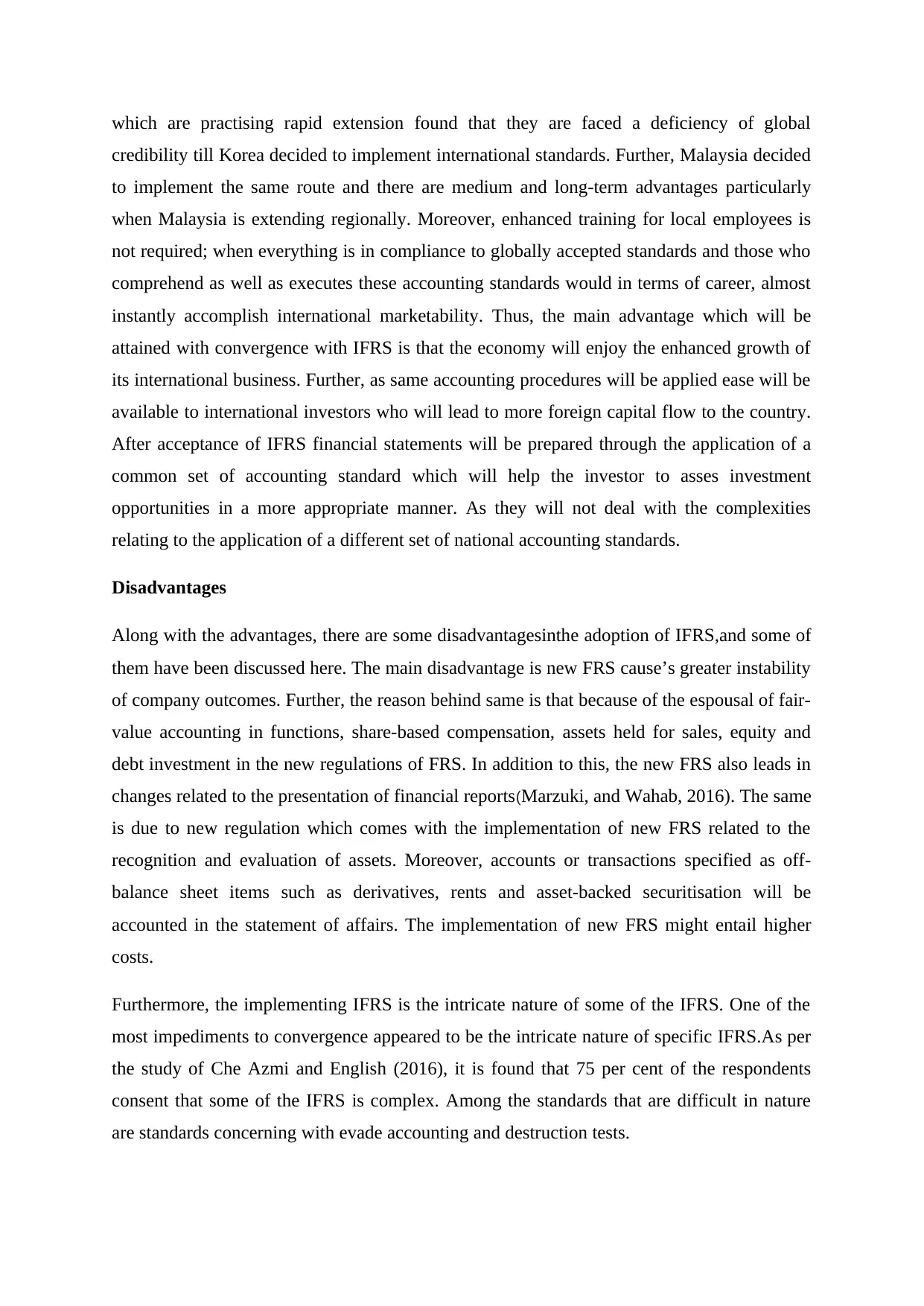
which are practising rapid extension found that they are faced a deficiency of global
credibility till Korea decided to implement international standards. Further, Malaysia decided
to implement the same route and there are medium and long-term advantages particularly
when Malaysia is extending regionally. Moreover, enhanced training for local employees is
not required; when everything is in compliance to globally accepted standards and those who
comprehend as well as executes these accounting standards would in terms of career, almost
instantly accomplish international marketability. Thus, the main advantage which will be
attained with convergence with IFRS is that the economy will enjoy the enhanced growth of
its international business. Further, as same accounting procedures will be applied ease will be
available to international investors who will lead to more foreign capital flow to the country.
After acceptance of IFRS financial statements will be prepared through the application of a
common set of accounting standard which will help the investor to asses investment
opportunities in a more appropriate manner. As they will not deal with the complexities
relating to the application of a different set of national accounting standards.
Disadvantages
Along with the advantages, there are some disadvantagesinthe adoption of IFRS,and some of
them have been discussed here. The main disadvantage is new FRS cause’s greater instability
of company outcomes. Further, the reason behind same is that because of the espousal of fair-
value accounting in functions, share-based compensation, assets held for sales, equity and
debt investment in the new regulations of FRS. In addition to this, the new FRS also leads in
changes related to the presentation of financial reports(Marzuki, and Wahab, 2016). The same
is due to new regulation which comes with the implementation of new FRS related to the
recognition and evaluation of assets. Moreover, accounts or transactions specified as off-
balance sheet items such as derivatives, rents and asset-backed securitisation will be
accounted in the statement of affairs. The implementation of new FRS might entail higher
costs.
Furthermore, the implementing IFRS is the intricate nature of some of the IFRS. One of the
most impediments to convergence appeared to be the intricate nature of specific IFRS.As per
the study of Che Azmi and English (2016), it is found that 75 per cent of the respondents
consent that some of the IFRS is complex. Among the standards that are difficult in nature
are standards concerning with evade accounting and destruction tests.
credibility till Korea decided to implement international standards. Further, Malaysia decided
to implement the same route and there are medium and long-term advantages particularly
when Malaysia is extending regionally. Moreover, enhanced training for local employees is
not required; when everything is in compliance to globally accepted standards and those who
comprehend as well as executes these accounting standards would in terms of career, almost
instantly accomplish international marketability. Thus, the main advantage which will be
attained with convergence with IFRS is that the economy will enjoy the enhanced growth of
its international business. Further, as same accounting procedures will be applied ease will be
available to international investors who will lead to more foreign capital flow to the country.
After acceptance of IFRS financial statements will be prepared through the application of a
common set of accounting standard which will help the investor to asses investment
opportunities in a more appropriate manner. As they will not deal with the complexities
relating to the application of a different set of national accounting standards.
Disadvantages
Along with the advantages, there are some disadvantagesinthe adoption of IFRS,and some of
them have been discussed here. The main disadvantage is new FRS cause’s greater instability
of company outcomes. Further, the reason behind same is that because of the espousal of fair-
value accounting in functions, share-based compensation, assets held for sales, equity and
debt investment in the new regulations of FRS. In addition to this, the new FRS also leads in
changes related to the presentation of financial reports(Marzuki, and Wahab, 2016). The same
is due to new regulation which comes with the implementation of new FRS related to the
recognition and evaluation of assets. Moreover, accounts or transactions specified as off-
balance sheet items such as derivatives, rents and asset-backed securitisation will be
accounted in the statement of affairs. The implementation of new FRS might entail higher
costs.
Furthermore, the implementing IFRS is the intricate nature of some of the IFRS. One of the
most impediments to convergence appeared to be the intricate nature of specific IFRS.As per
the study of Che Azmi and English (2016), it is found that 75 per cent of the respondents
consent that some of the IFRS is complex. Among the standards that are difficult in nature
are standards concerning with evade accounting and destruction tests.
Paraphrase This Document
Need a fresh take? Get an instant paraphrase of this document with our AI Paraphraser
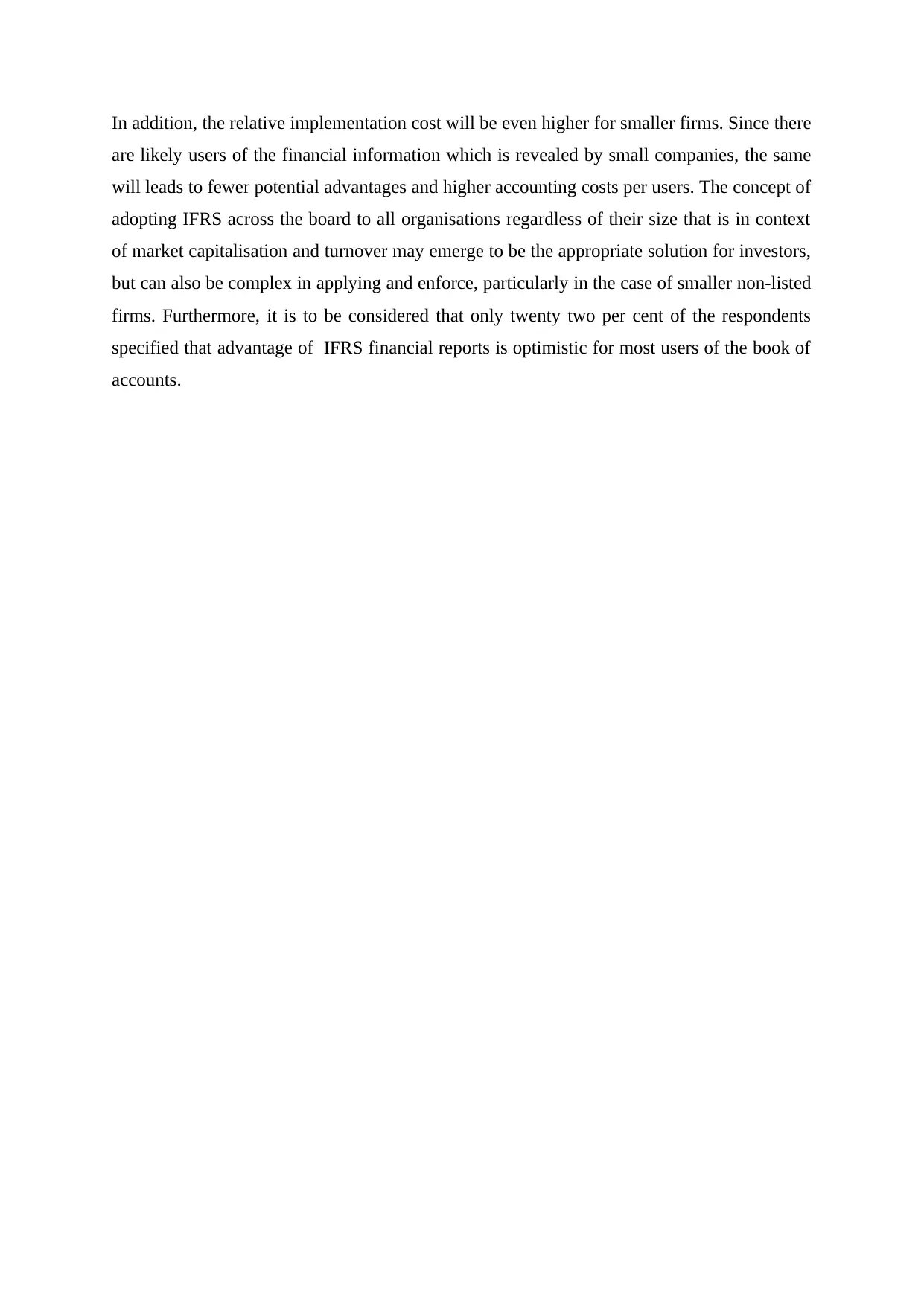
In addition, the relative implementation cost will be even higher for smaller firms. Since there
are likely users of the financial information which is revealed by small companies, the same
will leads to fewer potential advantages and higher accounting costs per users. The concept of
adopting IFRS across the board to all organisations regardless of their size that is in context
of market capitalisation and turnover may emerge to be the appropriate solution for investors,
but can also be complex in applying and enforce, particularly in the case of smaller non-listed
firms. Furthermore, it is to be considered that only twenty two per cent of the respondents
specified that advantage of IFRS financial reports is optimistic for most users of the book of
accounts.
are likely users of the financial information which is revealed by small companies, the same
will leads to fewer potential advantages and higher accounting costs per users. The concept of
adopting IFRS across the board to all organisations regardless of their size that is in context
of market capitalisation and turnover may emerge to be the appropriate solution for investors,
but can also be complex in applying and enforce, particularly in the case of smaller non-listed
firms. Furthermore, it is to be considered that only twenty two per cent of the respondents
specified that advantage of IFRS financial reports is optimistic for most users of the book of
accounts.
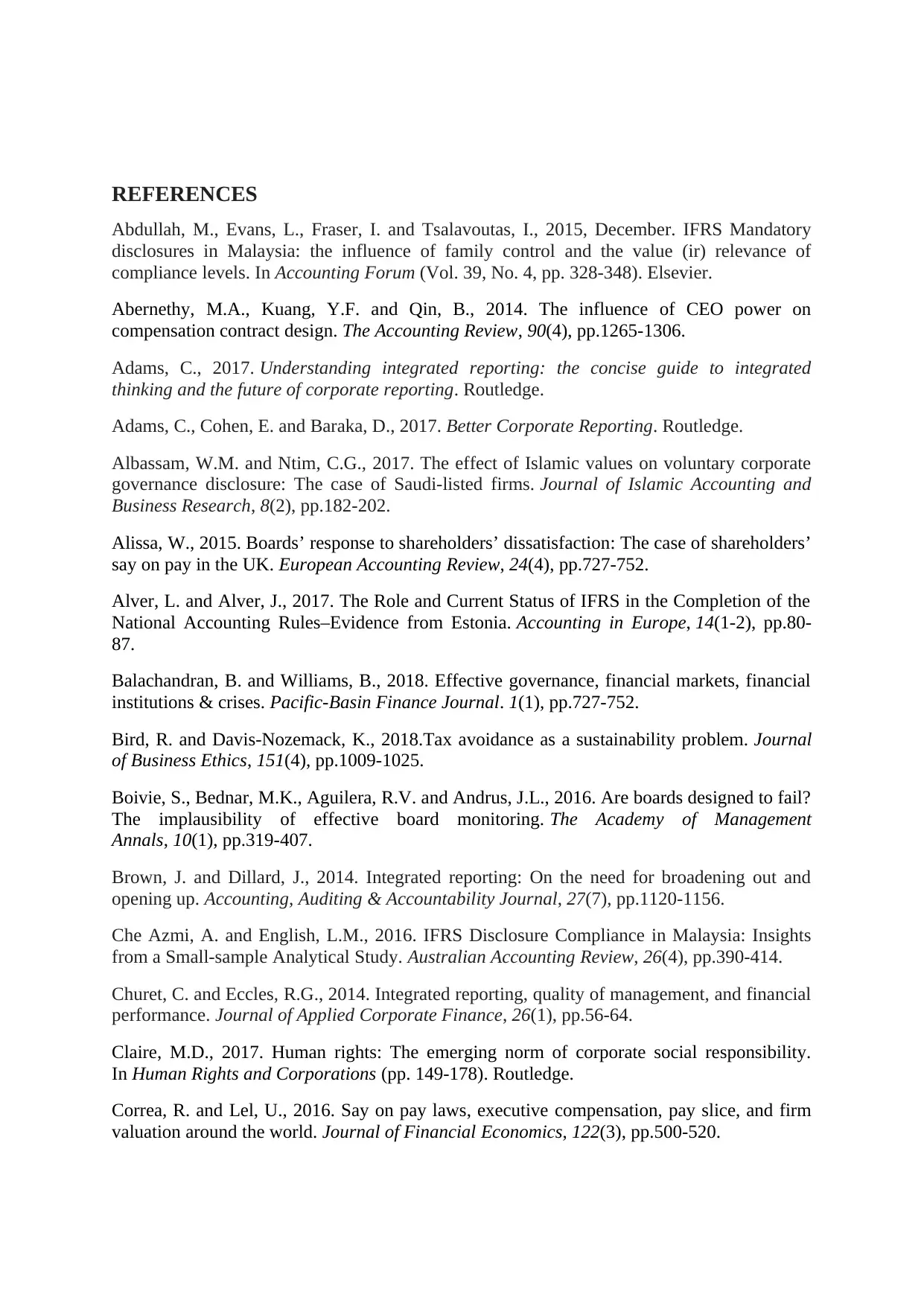
REFERENCES
Abdullah, M., Evans, L., Fraser, I. and Tsalavoutas, I., 2015, December. IFRS Mandatory
disclosures in Malaysia: the influence of family control and the value (ir) relevance of
compliance levels. In Accounting Forum (Vol. 39, No. 4, pp. 328-348). Elsevier.
Abernethy, M.A., Kuang, Y.F. and Qin, B., 2014. The influence of CEO power on
compensation contract design. The Accounting Review, 90(4), pp.1265-1306.
Adams, C., 2017. Understanding integrated reporting: the concise guide to integrated
thinking and the future of corporate reporting. Routledge.
Adams, C., Cohen, E. and Baraka, D., 2017. Better Corporate Reporting. Routledge.
Albassam, W.M. and Ntim, C.G., 2017. The effect of Islamic values on voluntary corporate
governance disclosure: The case of Saudi-listed firms. Journal of Islamic Accounting and
Business Research, 8(2), pp.182-202.
Alissa, W., 2015. Boards’ response to shareholders’ dissatisfaction: The case of shareholders’
say on pay in the UK. European Accounting Review, 24(4), pp.727-752.
Alver, L. and Alver, J., 2017. The Role and Current Status of IFRS in the Completion of the
National Accounting Rules–Evidence from Estonia. Accounting in Europe, 14(1-2), pp.80-
87.
Balachandran, B. and Williams, B., 2018. Effective governance, financial markets, financial
institutions & crises. Pacific-Basin Finance Journal. 1(1), pp.727-752.
Bird, R. and Davis-Nozemack, K., 2018.Tax avoidance as a sustainability problem. Journal
of Business Ethics, 151(4), pp.1009-1025.
Boivie, S., Bednar, M.K., Aguilera, R.V. and Andrus, J.L., 2016. Are boards designed to fail?
The implausibility of effective board monitoring. The Academy of Management
Annals, 10(1), pp.319-407.
Brown, J. and Dillard, J., 2014. Integrated reporting: On the need for broadening out and
opening up. Accounting, Auditing & Accountability Journal, 27(7), pp.1120-1156.
Che Azmi, A. and English, L.M., 2016. IFRS Disclosure Compliance in Malaysia: Insights
from a Small‐sample Analytical Study. Australian Accounting Review, 26(4), pp.390-414.
Churet, C. and Eccles, R.G., 2014. Integrated reporting, quality of management, and financial
performance. Journal of Applied Corporate Finance, 26(1), pp.56-64.
Claire, M.D., 2017. Human rights: The emerging norm of corporate social responsibility.
In Human Rights and Corporations (pp. 149-178). Routledge.
Correa, R. and Lel, U., 2016. Say on pay laws, executive compensation, pay slice, and firm
valuation around the world. Journal of Financial Economics, 122(3), pp.500-520.
Abdullah, M., Evans, L., Fraser, I. and Tsalavoutas, I., 2015, December. IFRS Mandatory
disclosures in Malaysia: the influence of family control and the value (ir) relevance of
compliance levels. In Accounting Forum (Vol. 39, No. 4, pp. 328-348). Elsevier.
Abernethy, M.A., Kuang, Y.F. and Qin, B., 2014. The influence of CEO power on
compensation contract design. The Accounting Review, 90(4), pp.1265-1306.
Adams, C., 2017. Understanding integrated reporting: the concise guide to integrated
thinking and the future of corporate reporting. Routledge.
Adams, C., Cohen, E. and Baraka, D., 2017. Better Corporate Reporting. Routledge.
Albassam, W.M. and Ntim, C.G., 2017. The effect of Islamic values on voluntary corporate
governance disclosure: The case of Saudi-listed firms. Journal of Islamic Accounting and
Business Research, 8(2), pp.182-202.
Alissa, W., 2015. Boards’ response to shareholders’ dissatisfaction: The case of shareholders’
say on pay in the UK. European Accounting Review, 24(4), pp.727-752.
Alver, L. and Alver, J., 2017. The Role and Current Status of IFRS in the Completion of the
National Accounting Rules–Evidence from Estonia. Accounting in Europe, 14(1-2), pp.80-
87.
Balachandran, B. and Williams, B., 2018. Effective governance, financial markets, financial
institutions & crises. Pacific-Basin Finance Journal. 1(1), pp.727-752.
Bird, R. and Davis-Nozemack, K., 2018.Tax avoidance as a sustainability problem. Journal
of Business Ethics, 151(4), pp.1009-1025.
Boivie, S., Bednar, M.K., Aguilera, R.V. and Andrus, J.L., 2016. Are boards designed to fail?
The implausibility of effective board monitoring. The Academy of Management
Annals, 10(1), pp.319-407.
Brown, J. and Dillard, J., 2014. Integrated reporting: On the need for broadening out and
opening up. Accounting, Auditing & Accountability Journal, 27(7), pp.1120-1156.
Che Azmi, A. and English, L.M., 2016. IFRS Disclosure Compliance in Malaysia: Insights
from a Small‐sample Analytical Study. Australian Accounting Review, 26(4), pp.390-414.
Churet, C. and Eccles, R.G., 2014. Integrated reporting, quality of management, and financial
performance. Journal of Applied Corporate Finance, 26(1), pp.56-64.
Claire, M.D., 2017. Human rights: The emerging norm of corporate social responsibility.
In Human Rights and Corporations (pp. 149-178). Routledge.
Correa, R. and Lel, U., 2016. Say on pay laws, executive compensation, pay slice, and firm
valuation around the world. Journal of Financial Economics, 122(3), pp.500-520.
You're viewing a preview
Unlock full access by subscribing today!
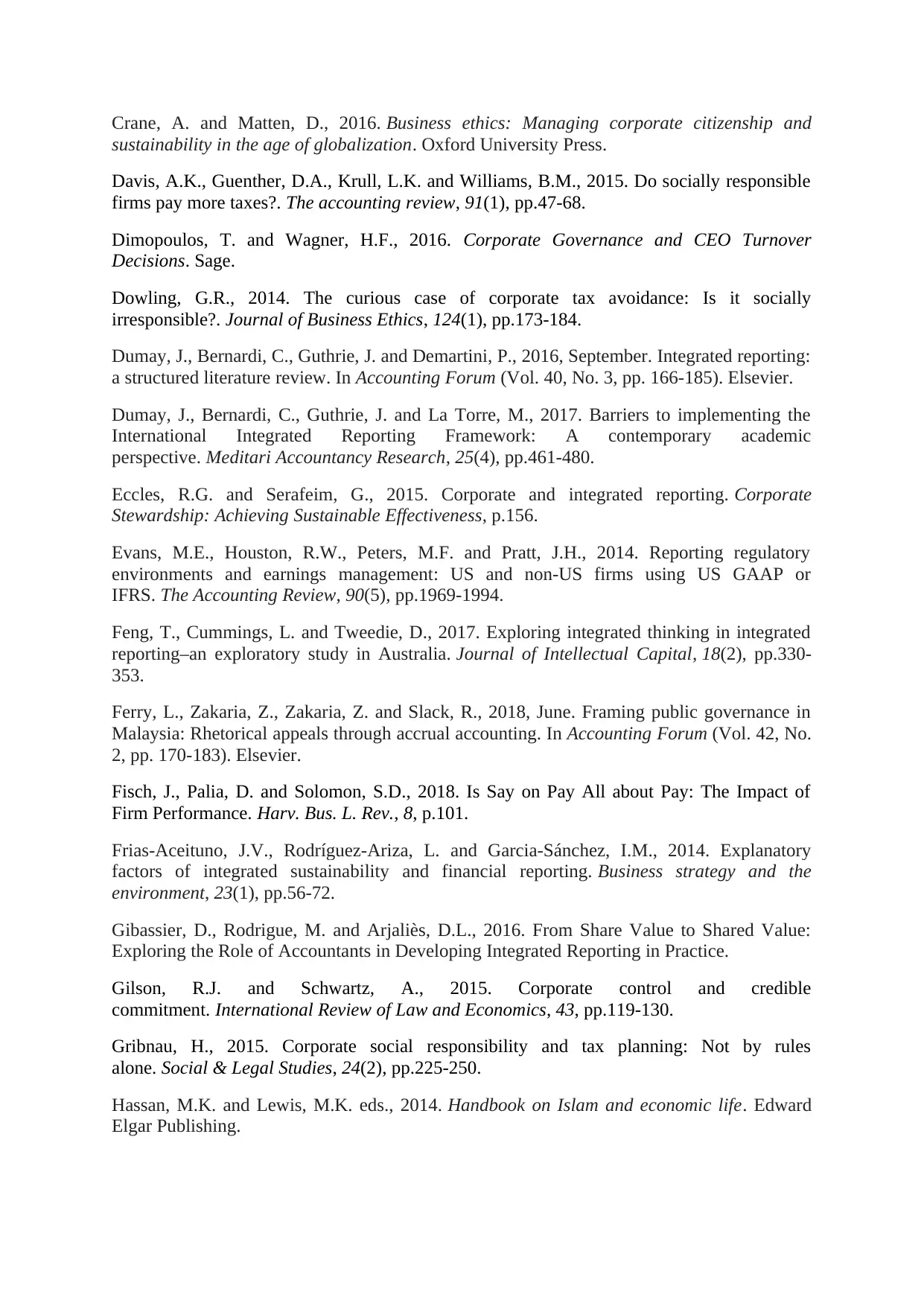
Crane, A. and Matten, D., 2016. Business ethics: Managing corporate citizenship and
sustainability in the age of globalization. Oxford University Press.
Davis, A.K., Guenther, D.A., Krull, L.K. and Williams, B.M., 2015. Do socially responsible
firms pay more taxes?. The accounting review, 91(1), pp.47-68.
Dimopoulos, T. and Wagner, H.F., 2016. Corporate Governance and CEO Turnover
Decisions. Sage.
Dowling, G.R., 2014. The curious case of corporate tax avoidance: Is it socially
irresponsible?. Journal of Business Ethics, 124(1), pp.173-184.
Dumay, J., Bernardi, C., Guthrie, J. and Demartini, P., 2016, September. Integrated reporting:
a structured literature review. In Accounting Forum (Vol. 40, No. 3, pp. 166-185). Elsevier.
Dumay, J., Bernardi, C., Guthrie, J. and La Torre, M., 2017. Barriers to implementing the
International Integrated Reporting Framework: A contemporary academic
perspective. Meditari Accountancy Research, 25(4), pp.461-480.
Eccles, R.G. and Serafeim, G., 2015. Corporate and integrated reporting. Corporate
Stewardship: Achieving Sustainable Effectiveness, p.156.
Evans, M.E., Houston, R.W., Peters, M.F. and Pratt, J.H., 2014. Reporting regulatory
environments and earnings management: US and non-US firms using US GAAP or
IFRS. The Accounting Review, 90(5), pp.1969-1994.
Feng, T., Cummings, L. and Tweedie, D., 2017. Exploring integrated thinking in integrated
reporting–an exploratory study in Australia. Journal of Intellectual Capital, 18(2), pp.330-
353.
Ferry, L., Zakaria, Z., Zakaria, Z. and Slack, R., 2018, June. Framing public governance in
Malaysia: Rhetorical appeals through accrual accounting. In Accounting Forum (Vol. 42, No.
2, pp. 170-183). Elsevier.
Fisch, J., Palia, D. and Solomon, S.D., 2018. Is Say on Pay All about Pay: The Impact of
Firm Performance. Harv. Bus. L. Rev., 8, p.101.
Frias‐Aceituno, J.V., Rodríguez‐Ariza, L. and Garcia‐Sánchez, I.M., 2014. Explanatory
factors of integrated sustainability and financial reporting. Business strategy and the
environment, 23(1), pp.56-72.
Gibassier, D., Rodrigue, M. and Arjaliès, D.L., 2016. From Share Value to Shared Value:
Exploring the Role of Accountants in Developing Integrated Reporting in Practice.
Gilson, R.J. and Schwartz, A., 2015. Corporate control and credible
commitment. International Review of Law and Economics, 43, pp.119-130.
Gribnau, H., 2015. Corporate social responsibility and tax planning: Not by rules
alone. Social & Legal Studies, 24(2), pp.225-250.
Hassan, M.K. and Lewis, M.K. eds., 2014. Handbook on Islam and economic life. Edward
Elgar Publishing.
sustainability in the age of globalization. Oxford University Press.
Davis, A.K., Guenther, D.A., Krull, L.K. and Williams, B.M., 2015. Do socially responsible
firms pay more taxes?. The accounting review, 91(1), pp.47-68.
Dimopoulos, T. and Wagner, H.F., 2016. Corporate Governance and CEO Turnover
Decisions. Sage.
Dowling, G.R., 2014. The curious case of corporate tax avoidance: Is it socially
irresponsible?. Journal of Business Ethics, 124(1), pp.173-184.
Dumay, J., Bernardi, C., Guthrie, J. and Demartini, P., 2016, September. Integrated reporting:
a structured literature review. In Accounting Forum (Vol. 40, No. 3, pp. 166-185). Elsevier.
Dumay, J., Bernardi, C., Guthrie, J. and La Torre, M., 2017. Barriers to implementing the
International Integrated Reporting Framework: A contemporary academic
perspective. Meditari Accountancy Research, 25(4), pp.461-480.
Eccles, R.G. and Serafeim, G., 2015. Corporate and integrated reporting. Corporate
Stewardship: Achieving Sustainable Effectiveness, p.156.
Evans, M.E., Houston, R.W., Peters, M.F. and Pratt, J.H., 2014. Reporting regulatory
environments and earnings management: US and non-US firms using US GAAP or
IFRS. The Accounting Review, 90(5), pp.1969-1994.
Feng, T., Cummings, L. and Tweedie, D., 2017. Exploring integrated thinking in integrated
reporting–an exploratory study in Australia. Journal of Intellectual Capital, 18(2), pp.330-
353.
Ferry, L., Zakaria, Z., Zakaria, Z. and Slack, R., 2018, June. Framing public governance in
Malaysia: Rhetorical appeals through accrual accounting. In Accounting Forum (Vol. 42, No.
2, pp. 170-183). Elsevier.
Fisch, J., Palia, D. and Solomon, S.D., 2018. Is Say on Pay All about Pay: The Impact of
Firm Performance. Harv. Bus. L. Rev., 8, p.101.
Frias‐Aceituno, J.V., Rodríguez‐Ariza, L. and Garcia‐Sánchez, I.M., 2014. Explanatory
factors of integrated sustainability and financial reporting. Business strategy and the
environment, 23(1), pp.56-72.
Gibassier, D., Rodrigue, M. and Arjaliès, D.L., 2016. From Share Value to Shared Value:
Exploring the Role of Accountants in Developing Integrated Reporting in Practice.
Gilson, R.J. and Schwartz, A., 2015. Corporate control and credible
commitment. International Review of Law and Economics, 43, pp.119-130.
Gribnau, H., 2015. Corporate social responsibility and tax planning: Not by rules
alone. Social & Legal Studies, 24(2), pp.225-250.
Hassan, M.K. and Lewis, M.K. eds., 2014. Handbook on Islam and economic life. Edward
Elgar Publishing.
Paraphrase This Document
Need a fresh take? Get an instant paraphrase of this document with our AI Paraphraser
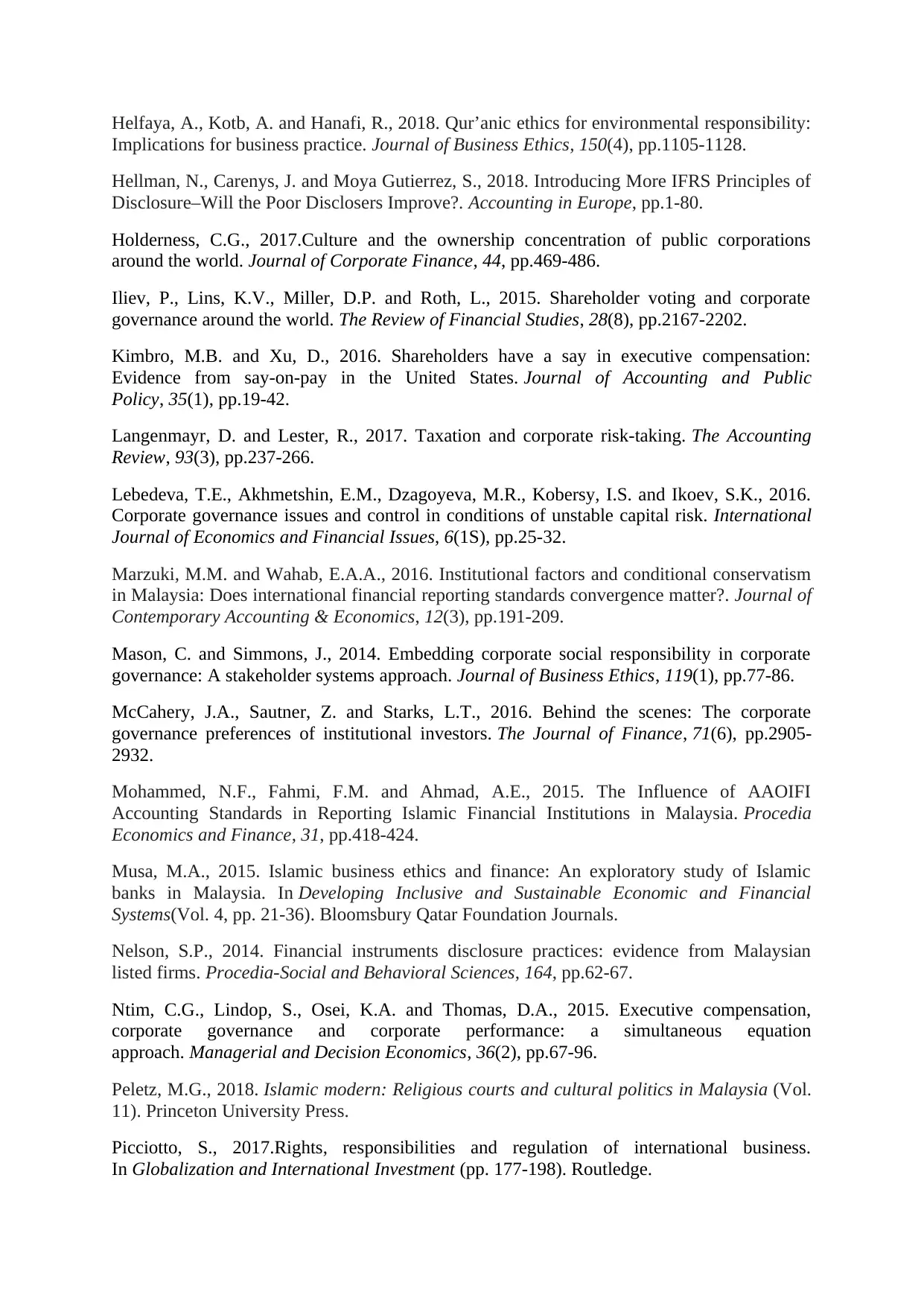
Helfaya, A., Kotb, A. and Hanafi, R., 2018. Qur’anic ethics for environmental responsibility:
Implications for business practice. Journal of Business Ethics, 150(4), pp.1105-1128.
Hellman, N., Carenys, J. and Moya Gutierrez, S., 2018. Introducing More IFRS Principles of
Disclosure–Will the Poor Disclosers Improve?. Accounting in Europe, pp.1-80.
Holderness, C.G., 2017.Culture and the ownership concentration of public corporations
around the world. Journal of Corporate Finance, 44, pp.469-486.
Iliev, P., Lins, K.V., Miller, D.P. and Roth, L., 2015. Shareholder voting and corporate
governance around the world. The Review of Financial Studies, 28(8), pp.2167-2202.
Kimbro, M.B. and Xu, D., 2016. Shareholders have a say in executive compensation:
Evidence from say-on-pay in the United States. Journal of Accounting and Public
Policy, 35(1), pp.19-42.
Langenmayr, D. and Lester, R., 2017. Taxation and corporate risk-taking. The Accounting
Review, 93(3), pp.237-266.
Lebedeva, T.E., Akhmetshin, E.M., Dzagoyeva, M.R., Kobersy, I.S. and Ikoev, S.K., 2016.
Corporate governance issues and control in conditions of unstable capital risk. International
Journal of Economics and Financial Issues, 6(1S), pp.25-32.
Marzuki, M.M. and Wahab, E.A.A., 2016. Institutional factors and conditional conservatism
in Malaysia: Does international financial reporting standards convergence matter?. Journal of
Contemporary Accounting & Economics, 12(3), pp.191-209.
Mason, C. and Simmons, J., 2014. Embedding corporate social responsibility in corporate
governance: A stakeholder systems approach. Journal of Business Ethics, 119(1), pp.77-86.
McCahery, J.A., Sautner, Z. and Starks, L.T., 2016. Behind the scenes: The corporate
governance preferences of institutional investors. The Journal of Finance, 71(6), pp.2905-
2932.
Mohammed, N.F., Fahmi, F.M. and Ahmad, A.E., 2015. The Influence of AAOIFI
Accounting Standards in Reporting Islamic Financial Institutions in Malaysia. Procedia
Economics and Finance, 31, pp.418-424.
Musa, M.A., 2015. Islamic business ethics and finance: An exploratory study of Islamic
banks in Malaysia. In Developing Inclusive and Sustainable Economic and Financial
Systems(Vol. 4, pp. 21-36). Bloomsbury Qatar Foundation Journals.
Nelson, S.P., 2014. Financial instruments disclosure practices: evidence from Malaysian
listed firms. Procedia-Social and Behavioral Sciences, 164, pp.62-67.
Ntim, C.G., Lindop, S., Osei, K.A. and Thomas, D.A., 2015. Executive compensation,
corporate governance and corporate performance: a simultaneous equation
approach. Managerial and Decision Economics, 36(2), pp.67-96.
Peletz, M.G., 2018. Islamic modern: Religious courts and cultural politics in Malaysia (Vol.
11). Princeton University Press.
Picciotto, S., 2017.Rights, responsibilities and regulation of international business.
In Globalization and International Investment (pp. 177-198). Routledge.
Implications for business practice. Journal of Business Ethics, 150(4), pp.1105-1128.
Hellman, N., Carenys, J. and Moya Gutierrez, S., 2018. Introducing More IFRS Principles of
Disclosure–Will the Poor Disclosers Improve?. Accounting in Europe, pp.1-80.
Holderness, C.G., 2017.Culture and the ownership concentration of public corporations
around the world. Journal of Corporate Finance, 44, pp.469-486.
Iliev, P., Lins, K.V., Miller, D.P. and Roth, L., 2015. Shareholder voting and corporate
governance around the world. The Review of Financial Studies, 28(8), pp.2167-2202.
Kimbro, M.B. and Xu, D., 2016. Shareholders have a say in executive compensation:
Evidence from say-on-pay in the United States. Journal of Accounting and Public
Policy, 35(1), pp.19-42.
Langenmayr, D. and Lester, R., 2017. Taxation and corporate risk-taking. The Accounting
Review, 93(3), pp.237-266.
Lebedeva, T.E., Akhmetshin, E.M., Dzagoyeva, M.R., Kobersy, I.S. and Ikoev, S.K., 2016.
Corporate governance issues and control in conditions of unstable capital risk. International
Journal of Economics and Financial Issues, 6(1S), pp.25-32.
Marzuki, M.M. and Wahab, E.A.A., 2016. Institutional factors and conditional conservatism
in Malaysia: Does international financial reporting standards convergence matter?. Journal of
Contemporary Accounting & Economics, 12(3), pp.191-209.
Mason, C. and Simmons, J., 2014. Embedding corporate social responsibility in corporate
governance: A stakeholder systems approach. Journal of Business Ethics, 119(1), pp.77-86.
McCahery, J.A., Sautner, Z. and Starks, L.T., 2016. Behind the scenes: The corporate
governance preferences of institutional investors. The Journal of Finance, 71(6), pp.2905-
2932.
Mohammed, N.F., Fahmi, F.M. and Ahmad, A.E., 2015. The Influence of AAOIFI
Accounting Standards in Reporting Islamic Financial Institutions in Malaysia. Procedia
Economics and Finance, 31, pp.418-424.
Musa, M.A., 2015. Islamic business ethics and finance: An exploratory study of Islamic
banks in Malaysia. In Developing Inclusive and Sustainable Economic and Financial
Systems(Vol. 4, pp. 21-36). Bloomsbury Qatar Foundation Journals.
Nelson, S.P., 2014. Financial instruments disclosure practices: evidence from Malaysian
listed firms. Procedia-Social and Behavioral Sciences, 164, pp.62-67.
Ntim, C.G., Lindop, S., Osei, K.A. and Thomas, D.A., 2015. Executive compensation,
corporate governance and corporate performance: a simultaneous equation
approach. Managerial and Decision Economics, 36(2), pp.67-96.
Peletz, M.G., 2018. Islamic modern: Religious courts and cultural politics in Malaysia (Vol.
11). Princeton University Press.
Picciotto, S., 2017.Rights, responsibilities and regulation of international business.
In Globalization and International Investment (pp. 177-198). Routledge.
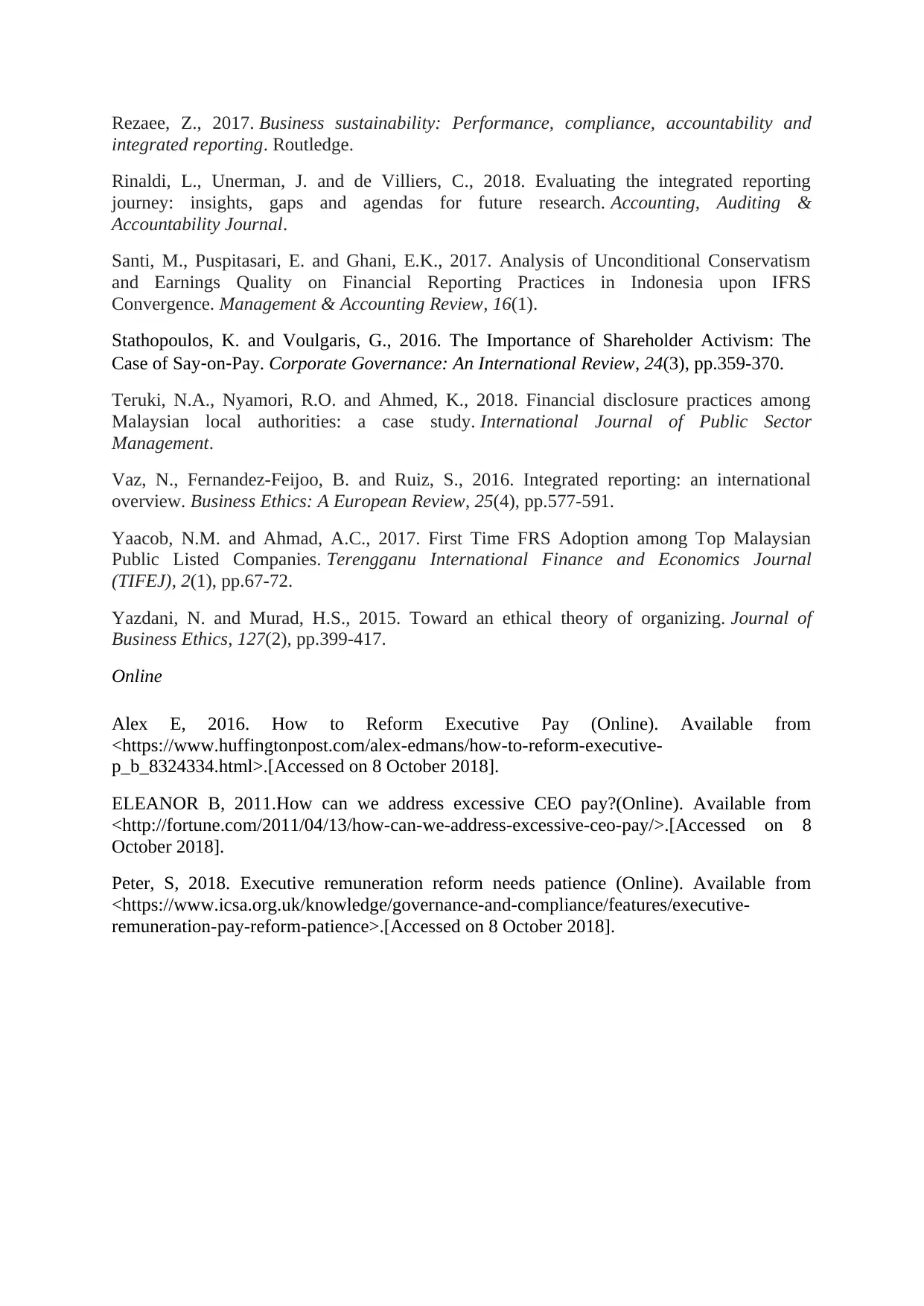
Rezaee, Z., 2017. Business sustainability: Performance, compliance, accountability and
integrated reporting. Routledge.
Rinaldi, L., Unerman, J. and de Villiers, C., 2018. Evaluating the integrated reporting
journey: insights, gaps and agendas for future research. Accounting, Auditing &
Accountability Journal.
Santi, M., Puspitasari, E. and Ghani, E.K., 2017. Analysis of Unconditional Conservatism
and Earnings Quality on Financial Reporting Practices in Indonesia upon IFRS
Convergence. Management & Accounting Review, 16(1).
Stathopoulos, K. and Voulgaris, G., 2016. The Importance of Shareholder Activism: The
Case of Say‐on‐Pay. Corporate Governance: An International Review, 24(3), pp.359-370.
Teruki, N.A., Nyamori, R.O. and Ahmed, K., 2018. Financial disclosure practices among
Malaysian local authorities: a case study. International Journal of Public Sector
Management.
Vaz, N., Fernandez‐Feijoo, B. and Ruiz, S., 2016. Integrated reporting: an international
overview. Business Ethics: A European Review, 25(4), pp.577-591.
Yaacob, N.M. and Ahmad, A.C., 2017. First Time FRS Adoption among Top Malaysian
Public Listed Companies. Terengganu International Finance and Economics Journal
(TIFEJ), 2(1), pp.67-72.
Yazdani, N. and Murad, H.S., 2015. Toward an ethical theory of organizing. Journal of
Business Ethics, 127(2), pp.399-417.
Online
Alex E, 2016. How to Reform Executive Pay (Online). Available from
<https://www.huffingtonpost.com/alex-edmans/how-to-reform-executive-
p_b_8324334.html>.[Accessed on 8 October 2018].
ELEANOR B, 2011.How can we address excessive CEO pay?(Online). Available from
<http://fortune.com/2011/04/13/how-can-we-address-excessive-ceo-pay/>.[Accessed on 8
October 2018].
Peter, S, 2018. Executive remuneration reform needs patience (Online). Available from
<https://www.icsa.org.uk/knowledge/governance-and-compliance/features/executive-
remuneration-pay-reform-patience>.[Accessed on 8 October 2018].
integrated reporting. Routledge.
Rinaldi, L., Unerman, J. and de Villiers, C., 2018. Evaluating the integrated reporting
journey: insights, gaps and agendas for future research. Accounting, Auditing &
Accountability Journal.
Santi, M., Puspitasari, E. and Ghani, E.K., 2017. Analysis of Unconditional Conservatism
and Earnings Quality on Financial Reporting Practices in Indonesia upon IFRS
Convergence. Management & Accounting Review, 16(1).
Stathopoulos, K. and Voulgaris, G., 2016. The Importance of Shareholder Activism: The
Case of Say‐on‐Pay. Corporate Governance: An International Review, 24(3), pp.359-370.
Teruki, N.A., Nyamori, R.O. and Ahmed, K., 2018. Financial disclosure practices among
Malaysian local authorities: a case study. International Journal of Public Sector
Management.
Vaz, N., Fernandez‐Feijoo, B. and Ruiz, S., 2016. Integrated reporting: an international
overview. Business Ethics: A European Review, 25(4), pp.577-591.
Yaacob, N.M. and Ahmad, A.C., 2017. First Time FRS Adoption among Top Malaysian
Public Listed Companies. Terengganu International Finance and Economics Journal
(TIFEJ), 2(1), pp.67-72.
Yazdani, N. and Murad, H.S., 2015. Toward an ethical theory of organizing. Journal of
Business Ethics, 127(2), pp.399-417.
Online
Alex E, 2016. How to Reform Executive Pay (Online). Available from
<https://www.huffingtonpost.com/alex-edmans/how-to-reform-executive-
p_b_8324334.html>.[Accessed on 8 October 2018].
ELEANOR B, 2011.How can we address excessive CEO pay?(Online). Available from
<http://fortune.com/2011/04/13/how-can-we-address-excessive-ceo-pay/>.[Accessed on 8
October 2018].
Peter, S, 2018. Executive remuneration reform needs patience (Online). Available from
<https://www.icsa.org.uk/knowledge/governance-and-compliance/features/executive-
remuneration-pay-reform-patience>.[Accessed on 8 October 2018].
You're viewing a preview
Unlock full access by subscribing today!
1 out of 27
Related Documents
Your All-in-One AI-Powered Toolkit for Academic Success.
+13062052269
info@desklib.com
Available 24*7 on WhatsApp / Email
![[object Object]](/_next/static/media/star-bottom.7253800d.svg)
Unlock your academic potential
© 2024 | Zucol Services PVT LTD | All rights reserved.





